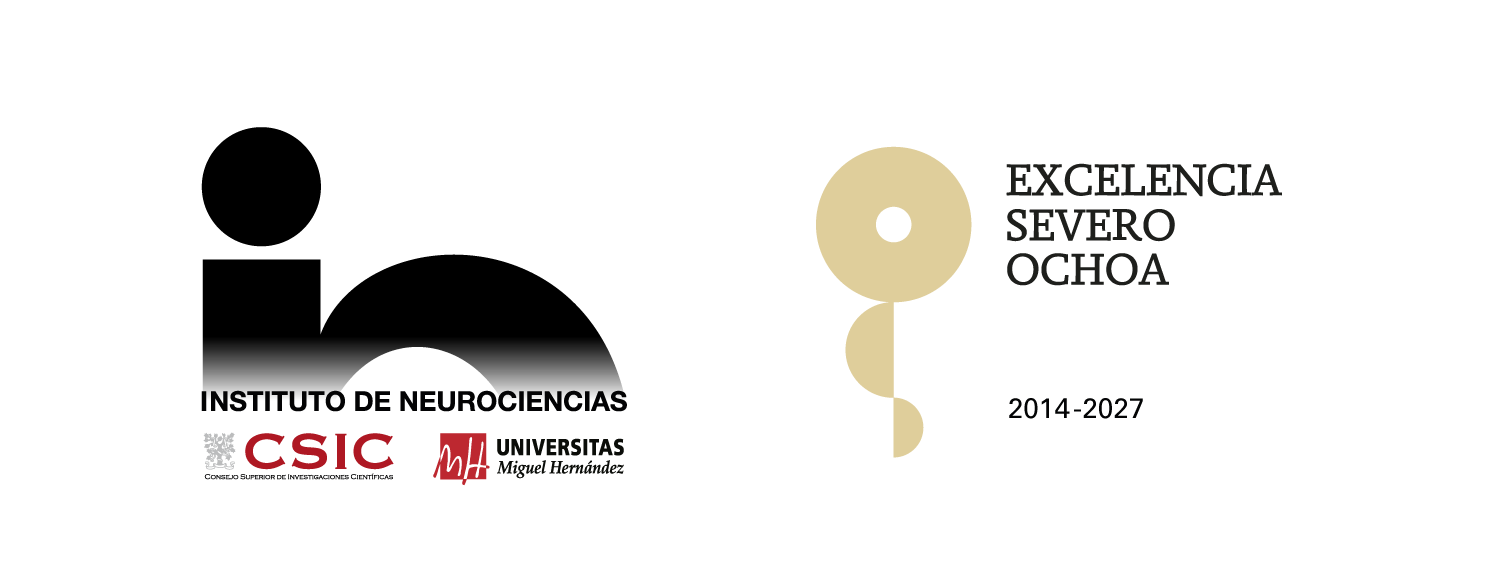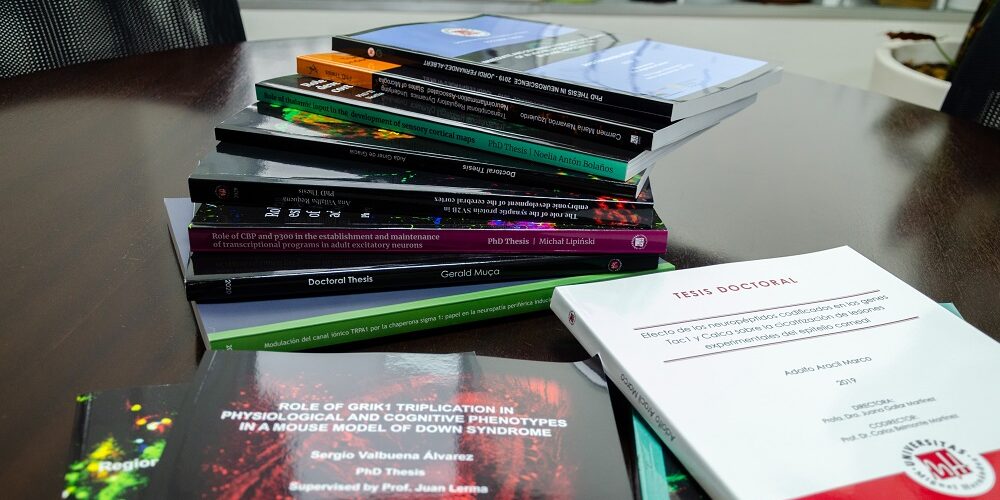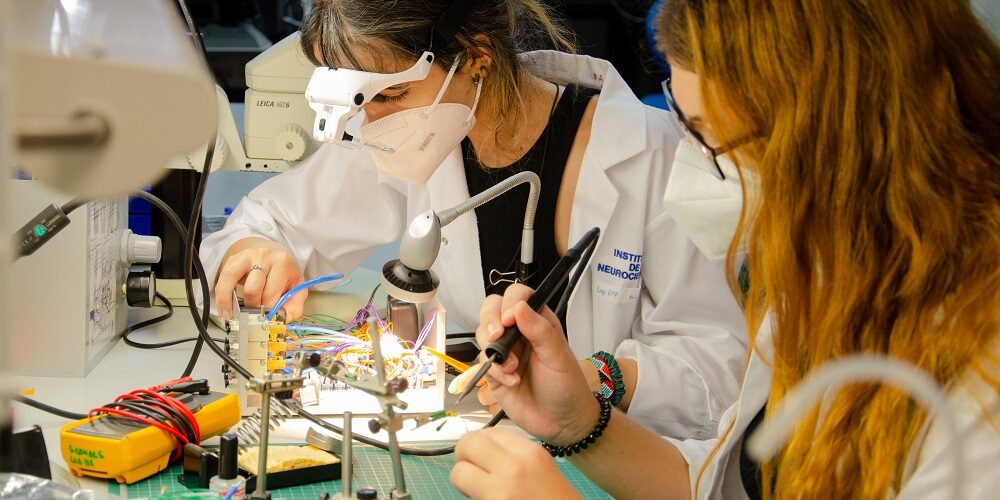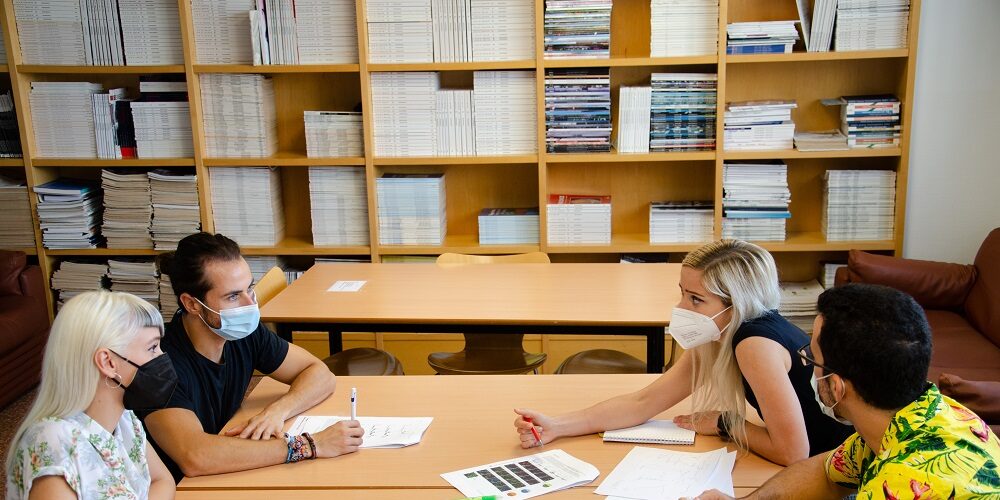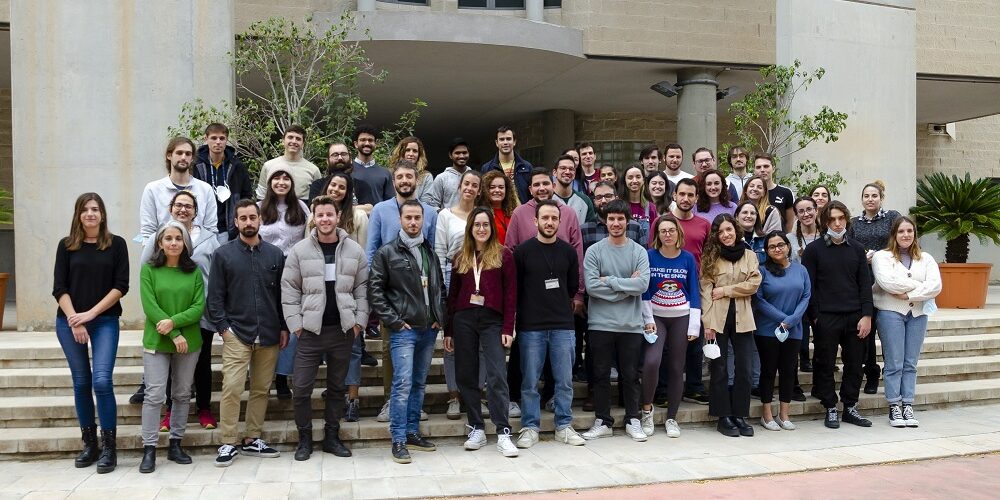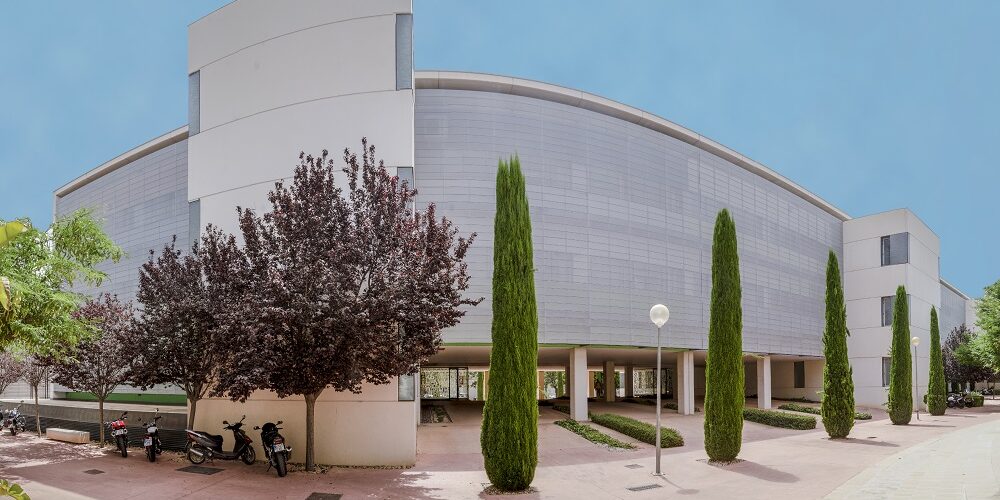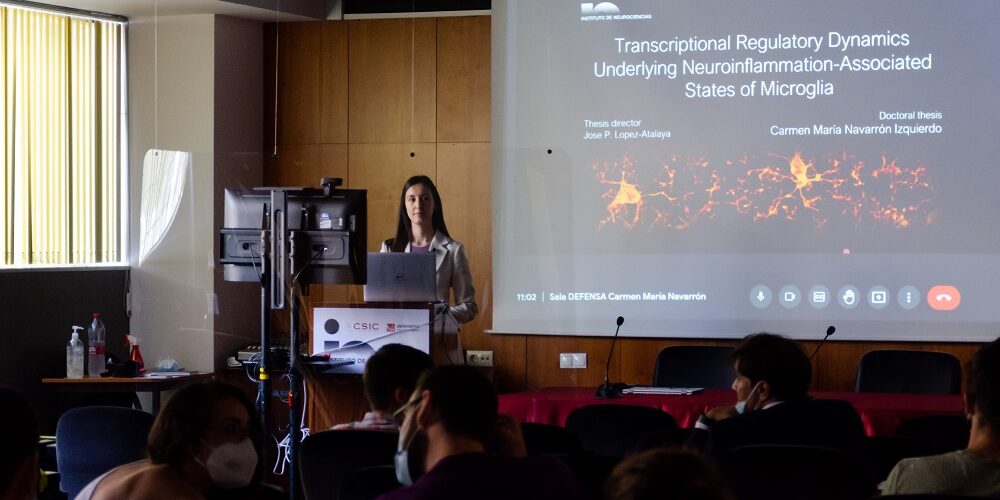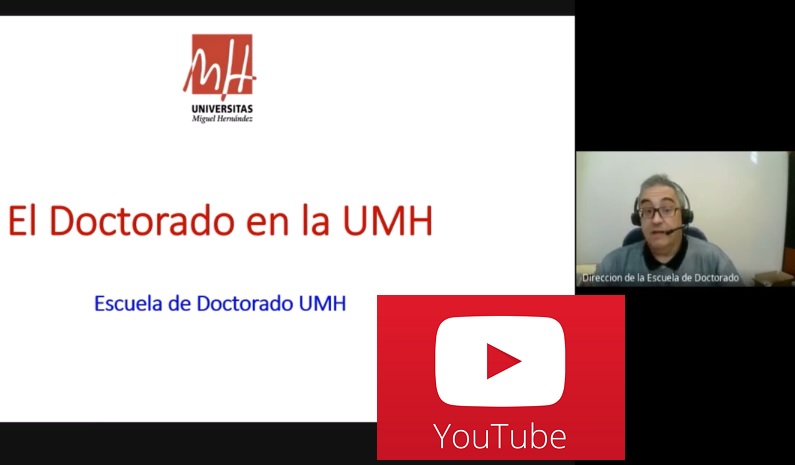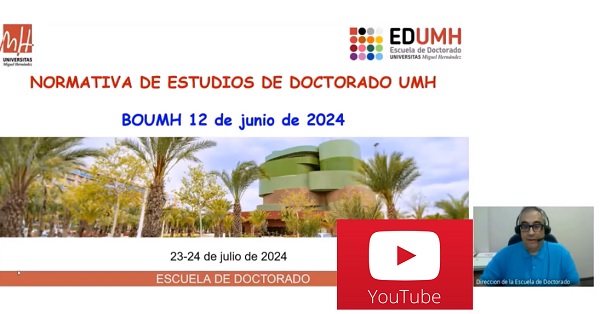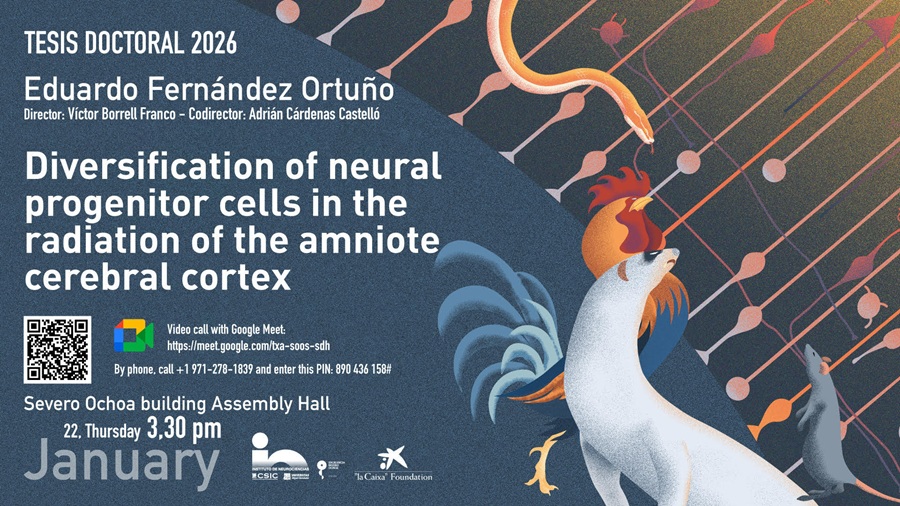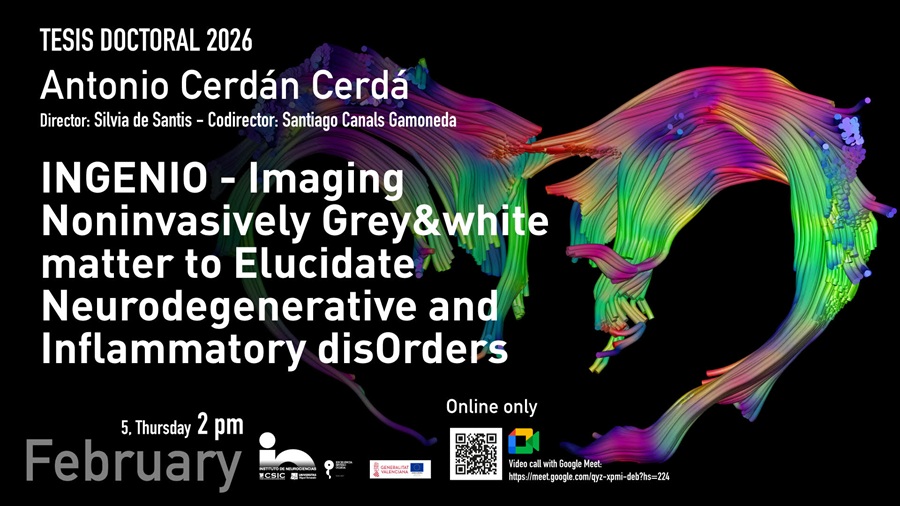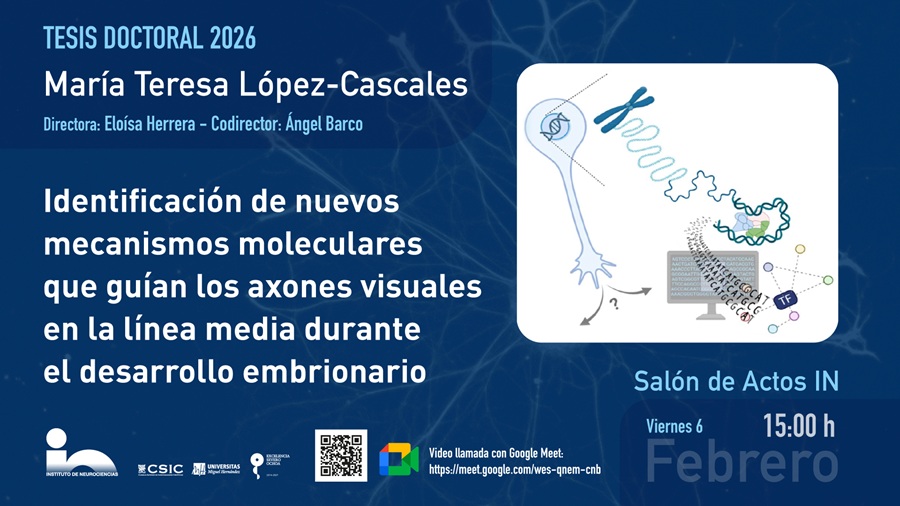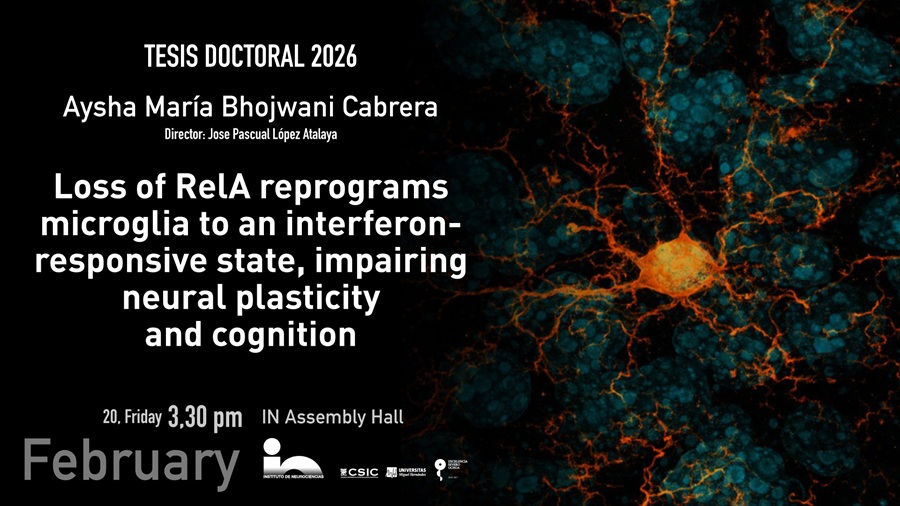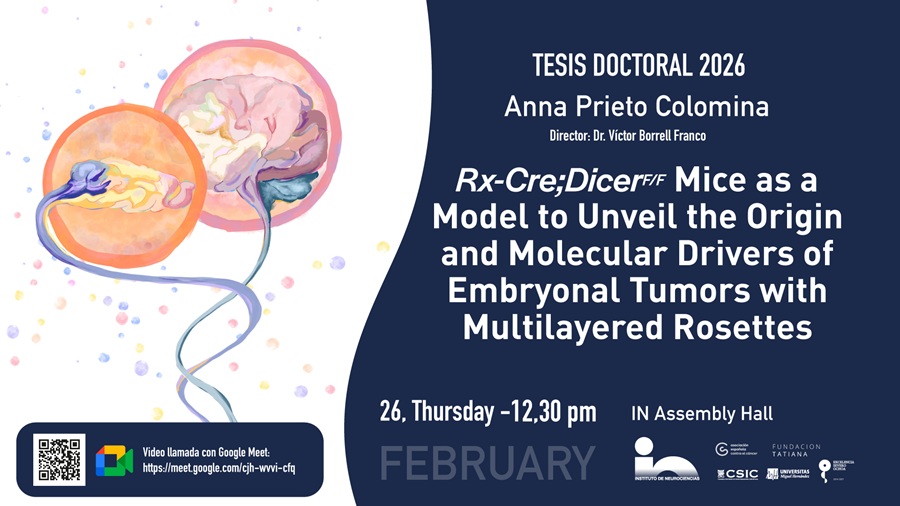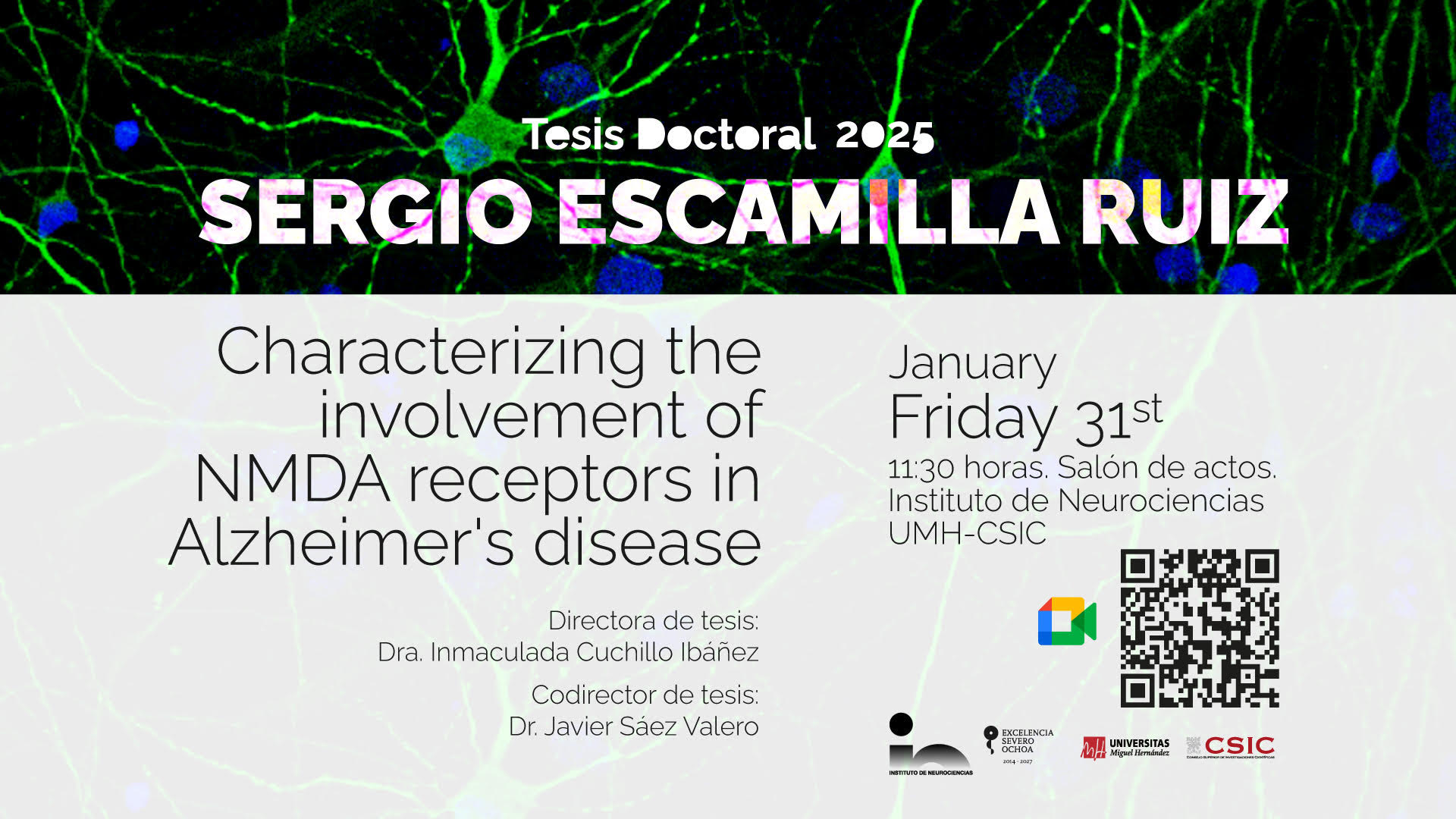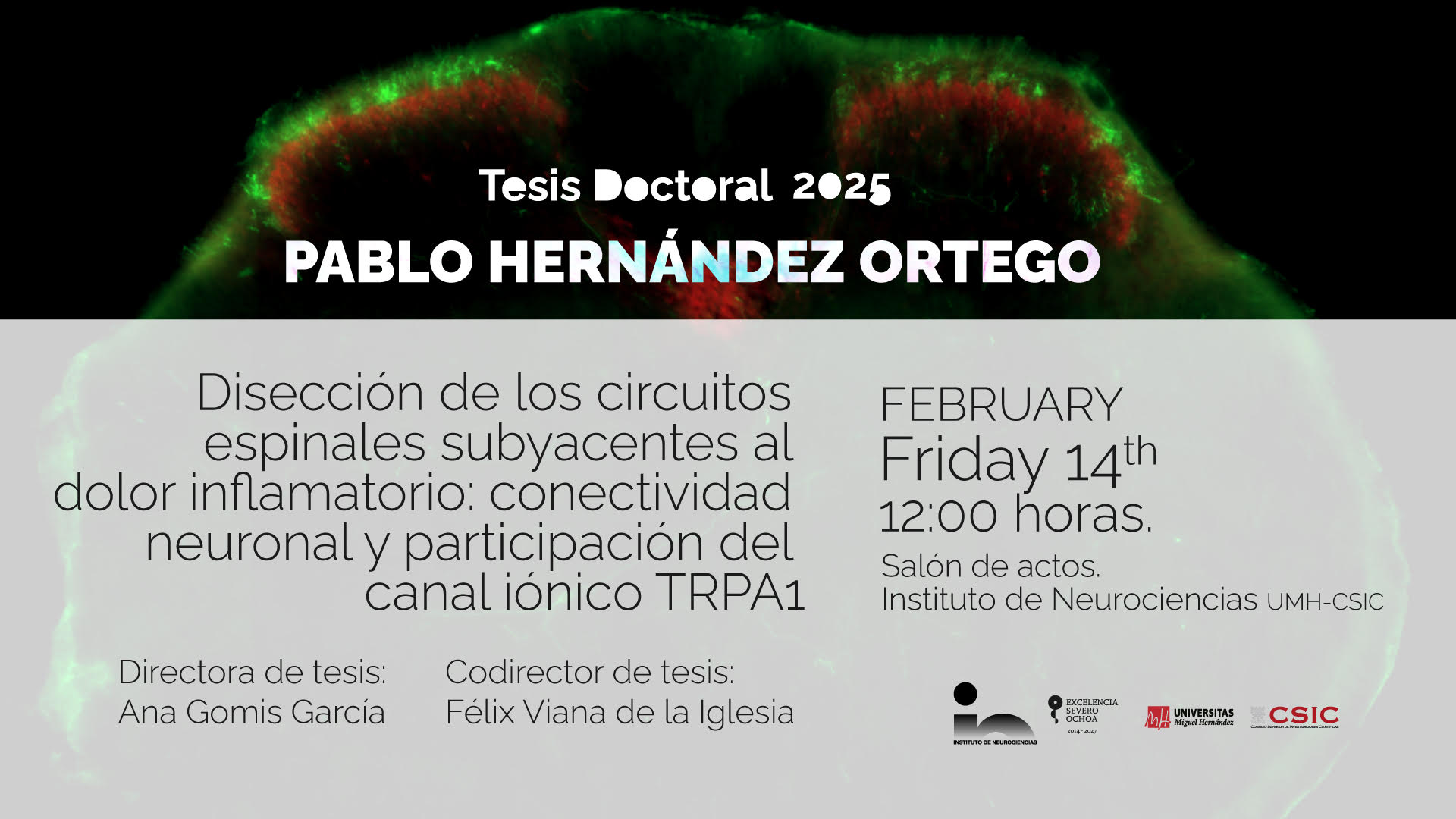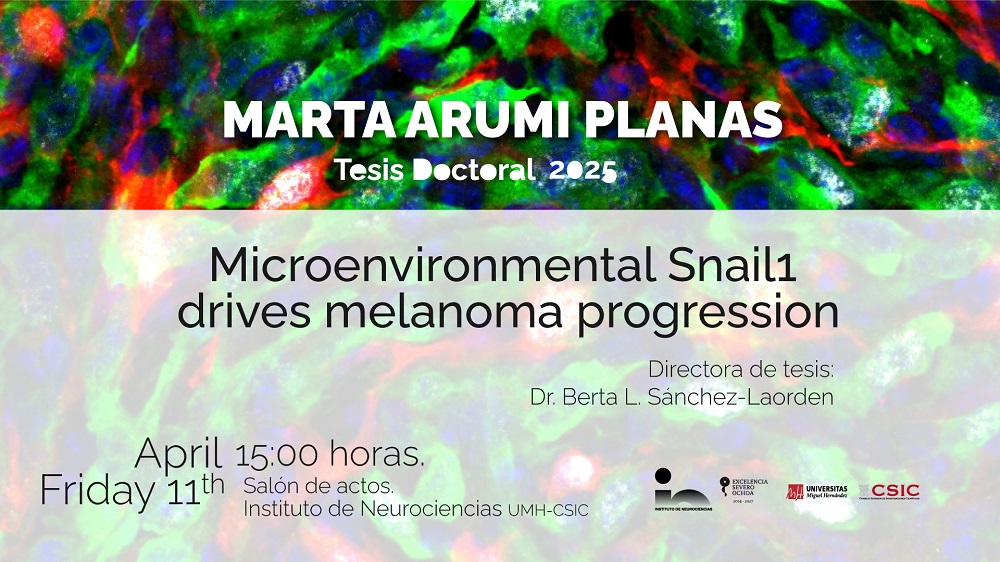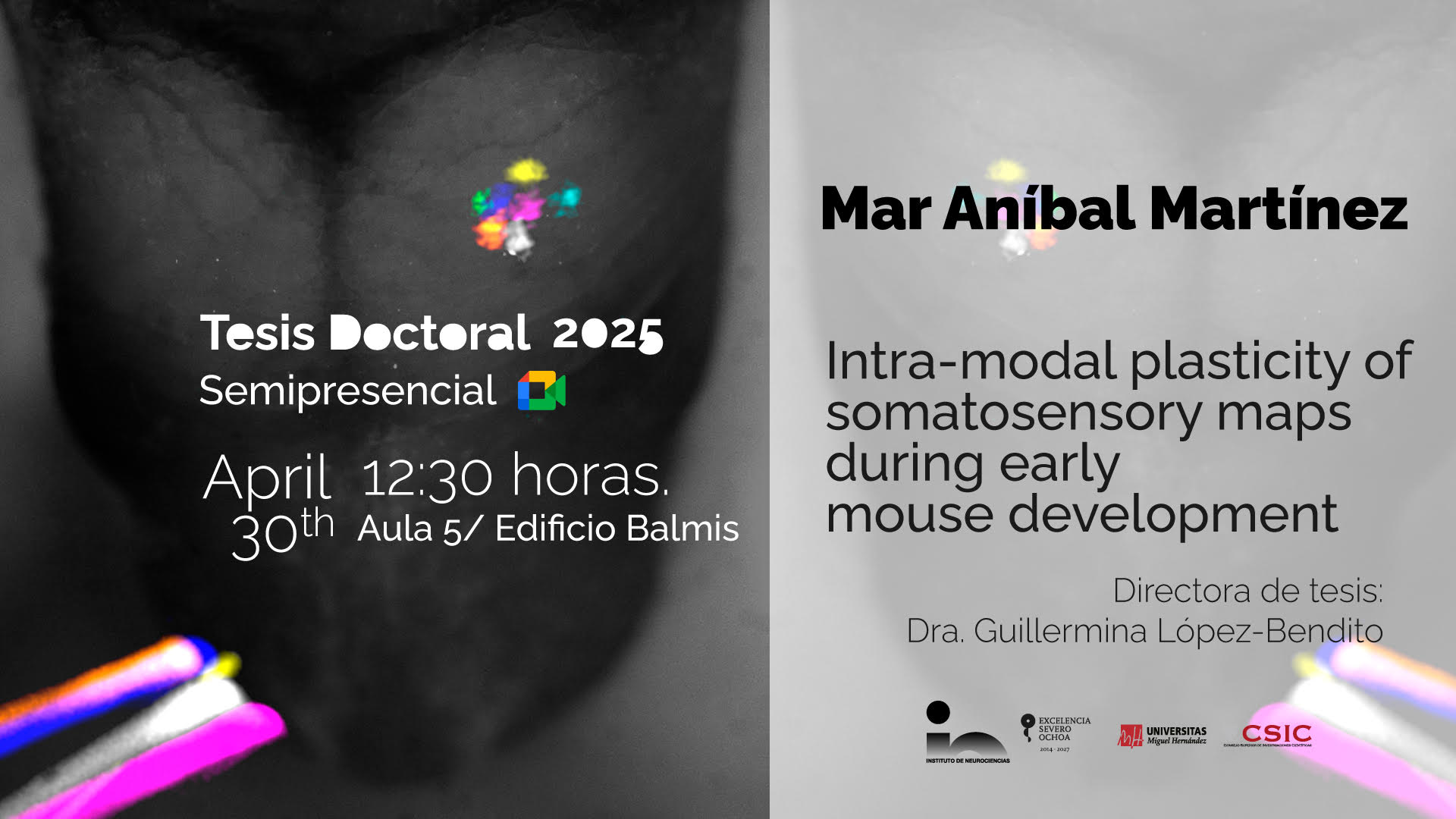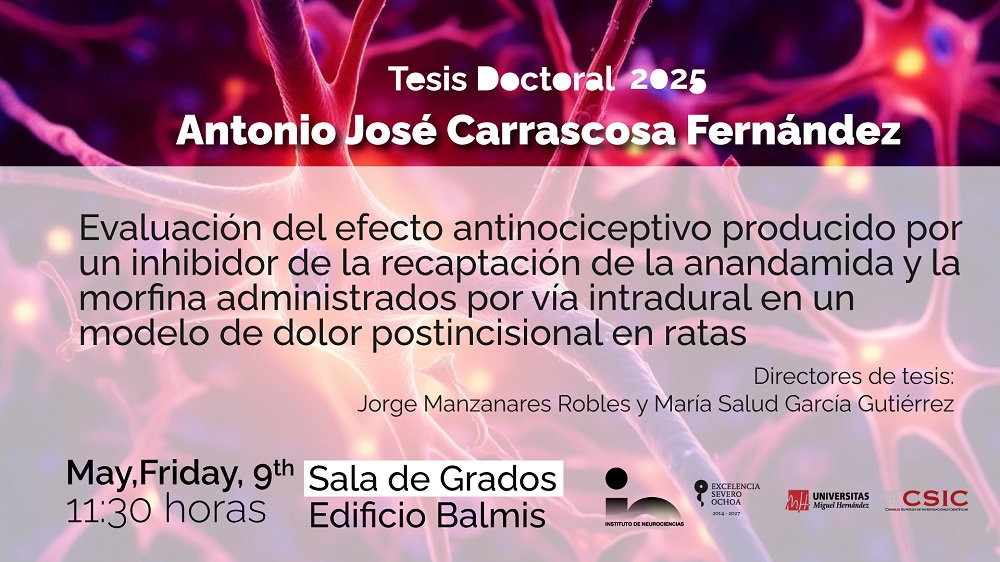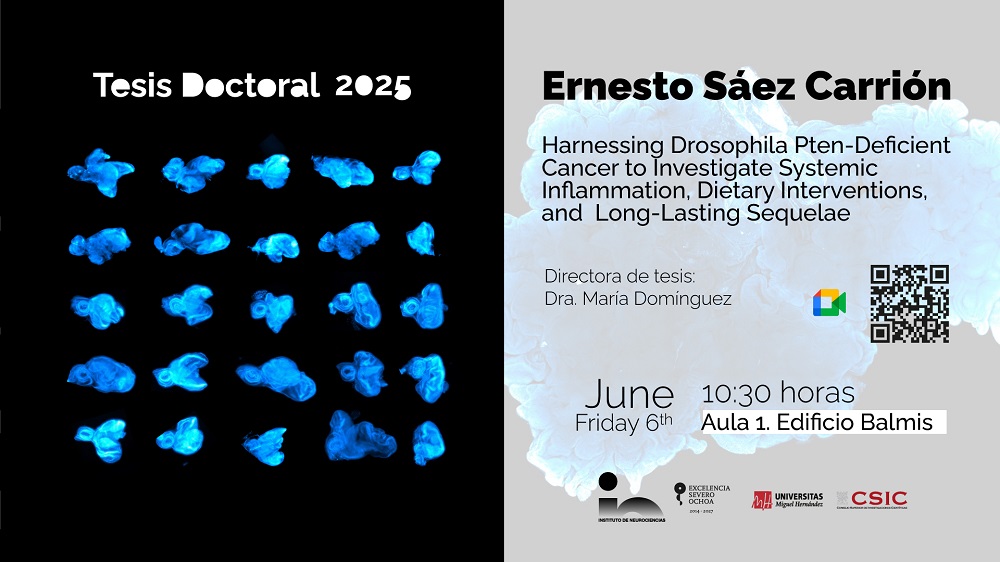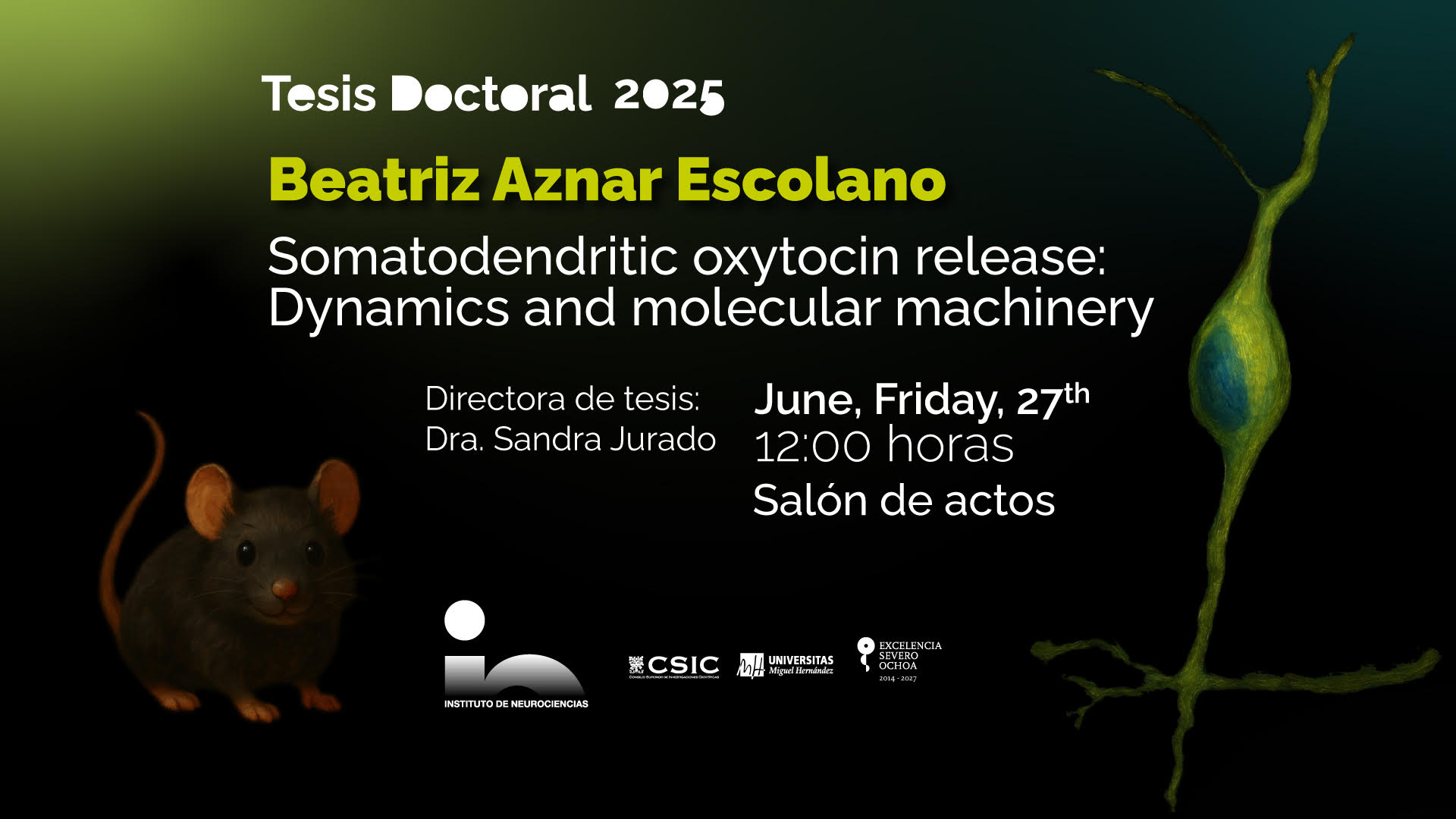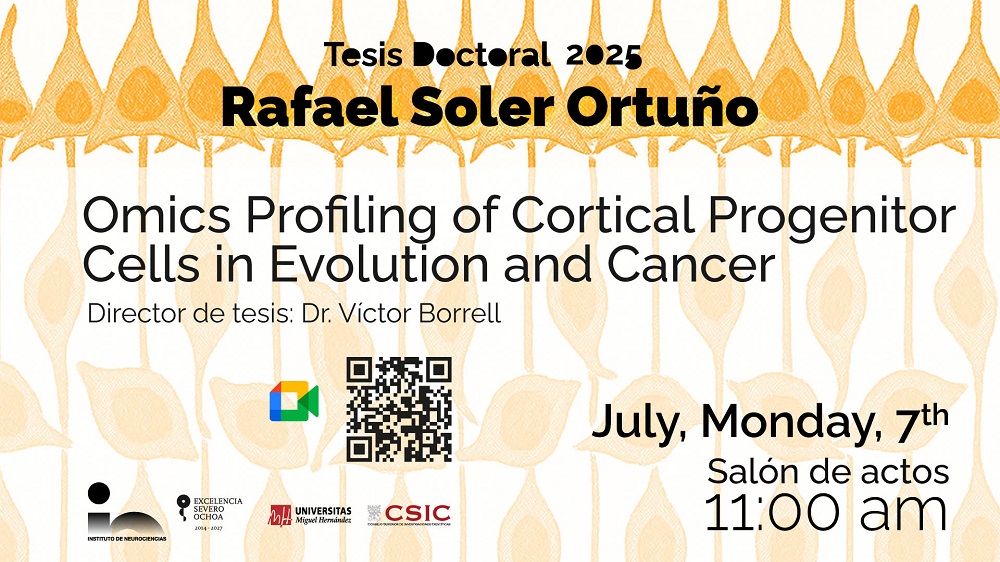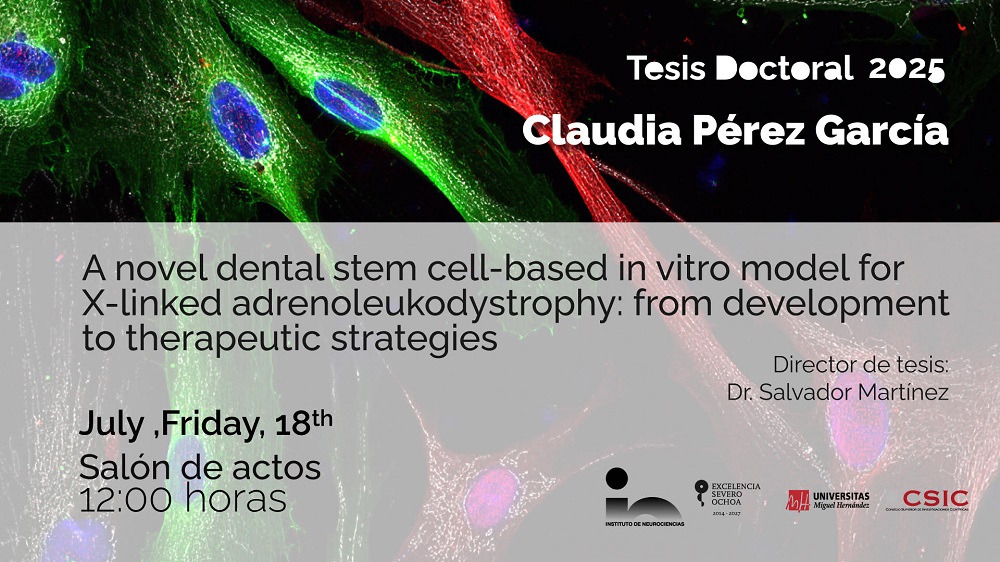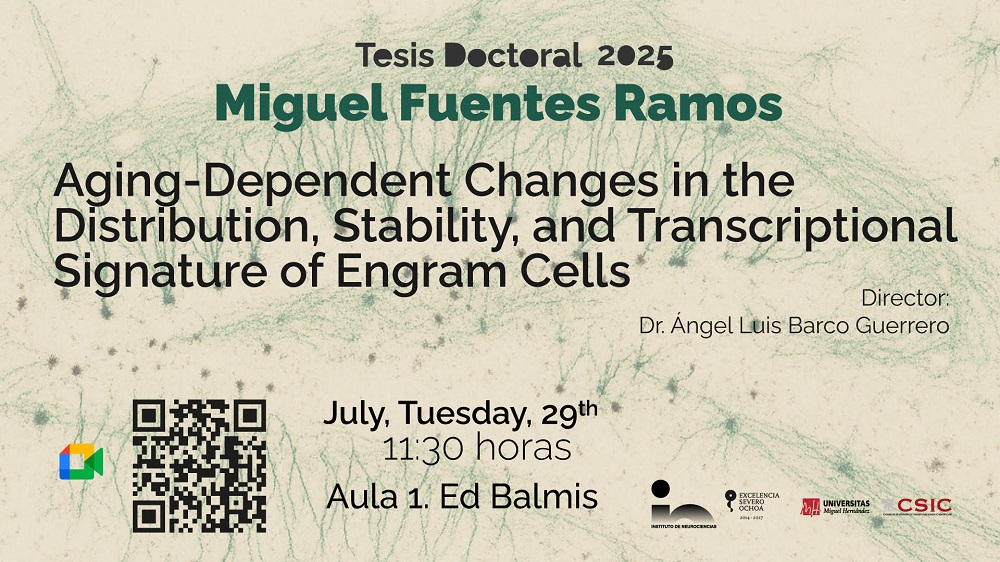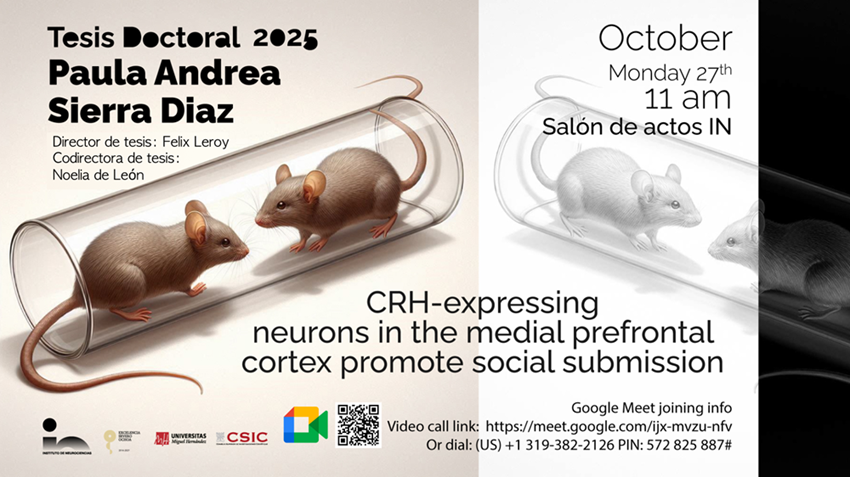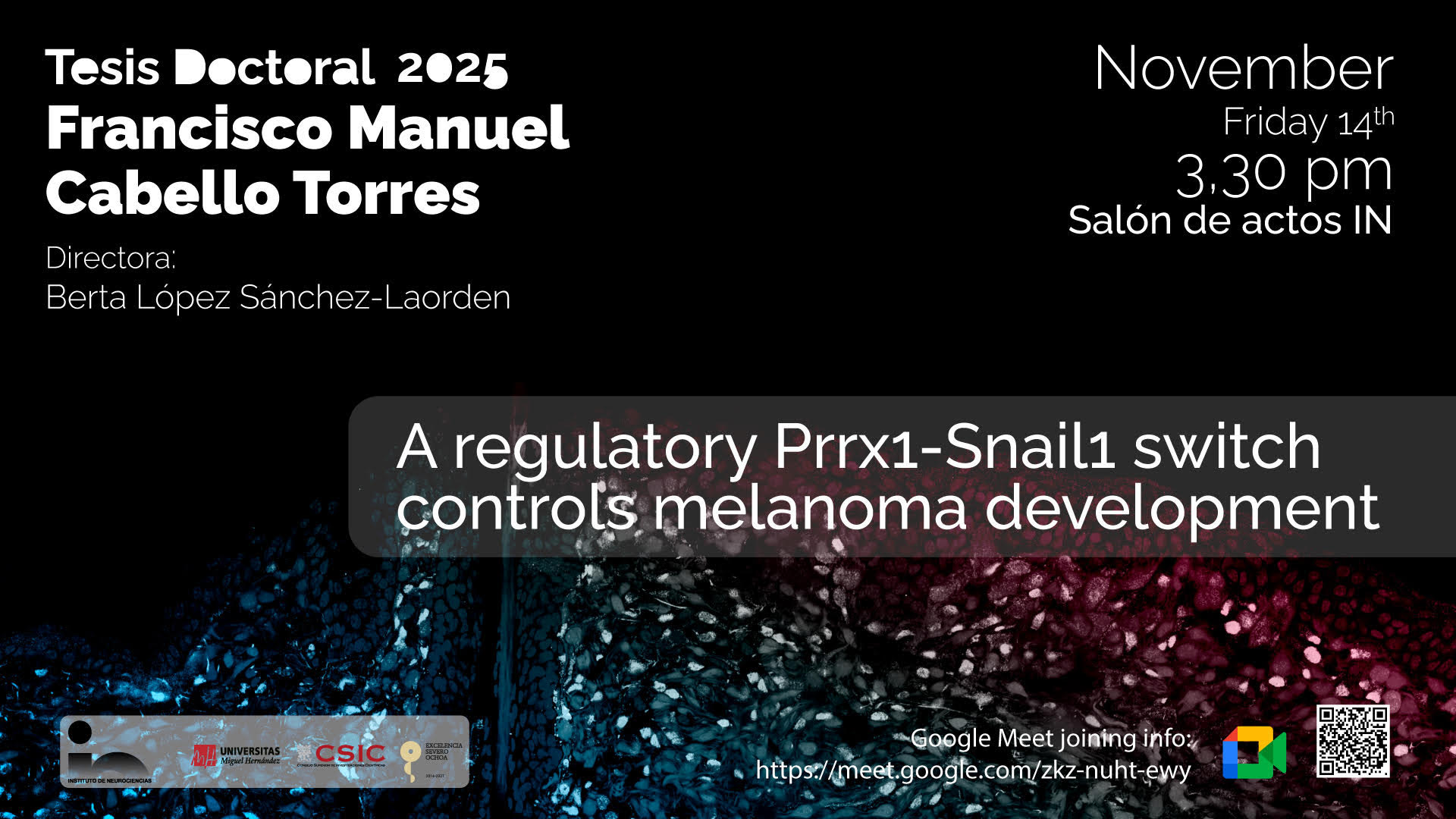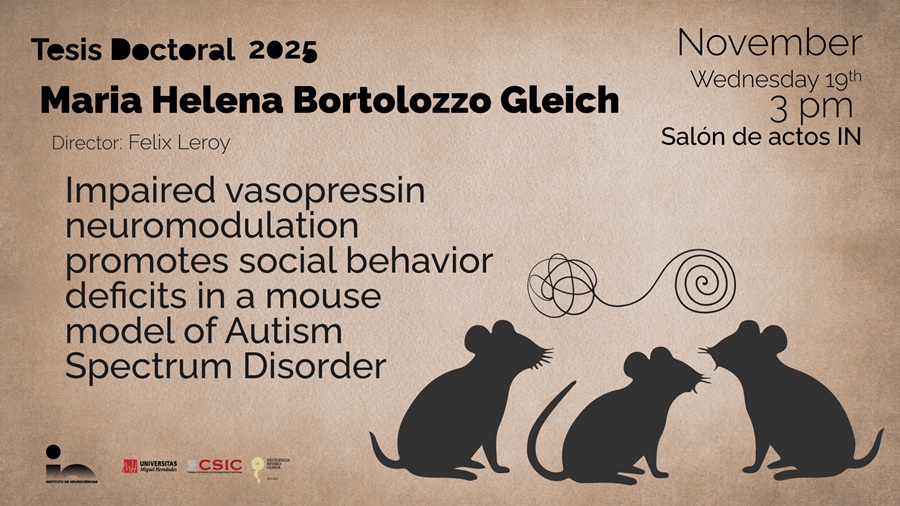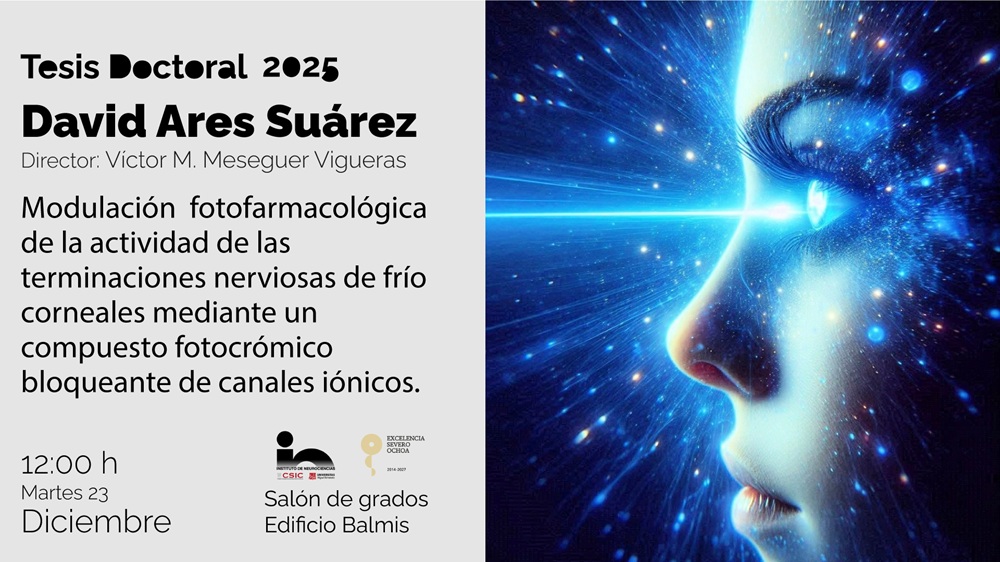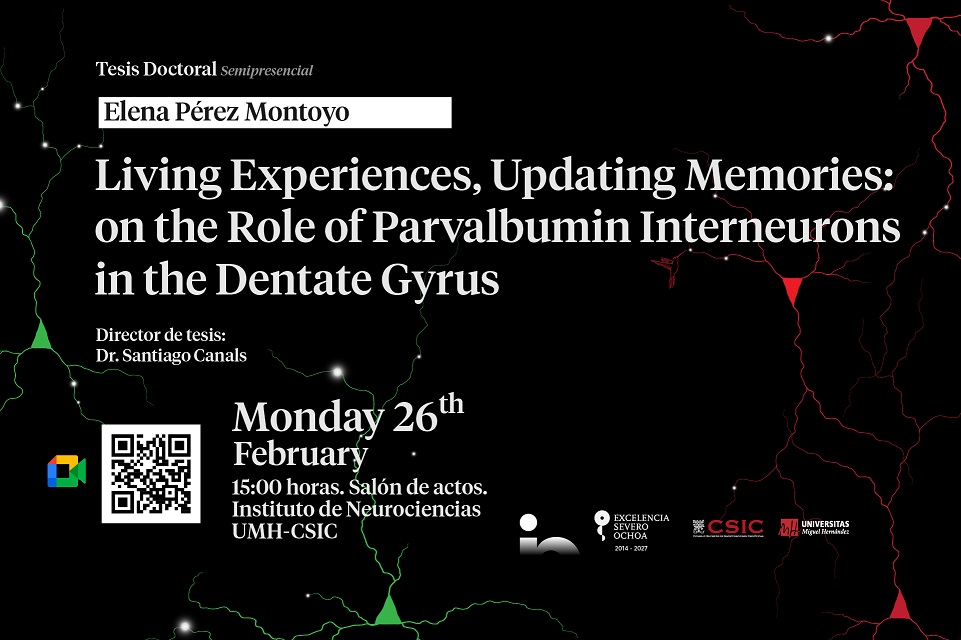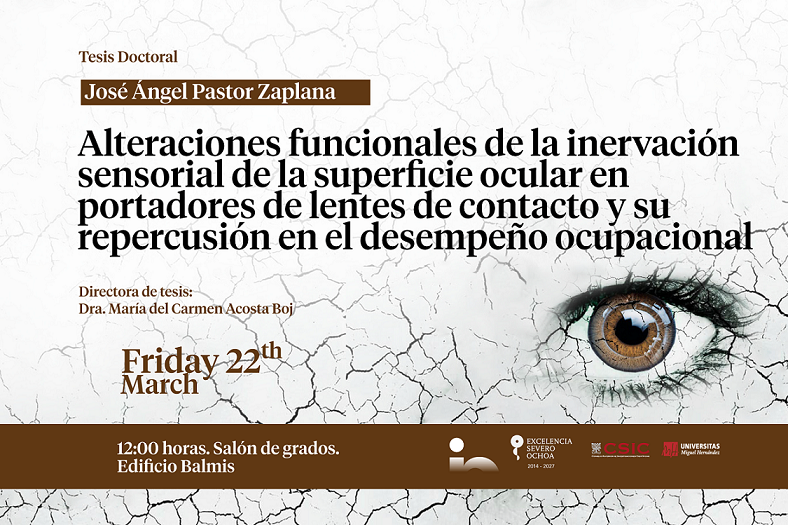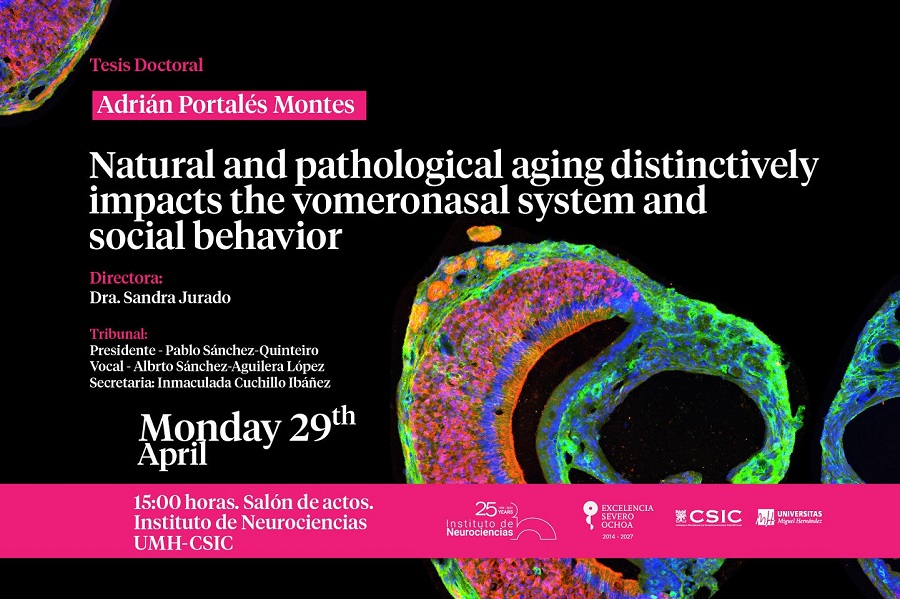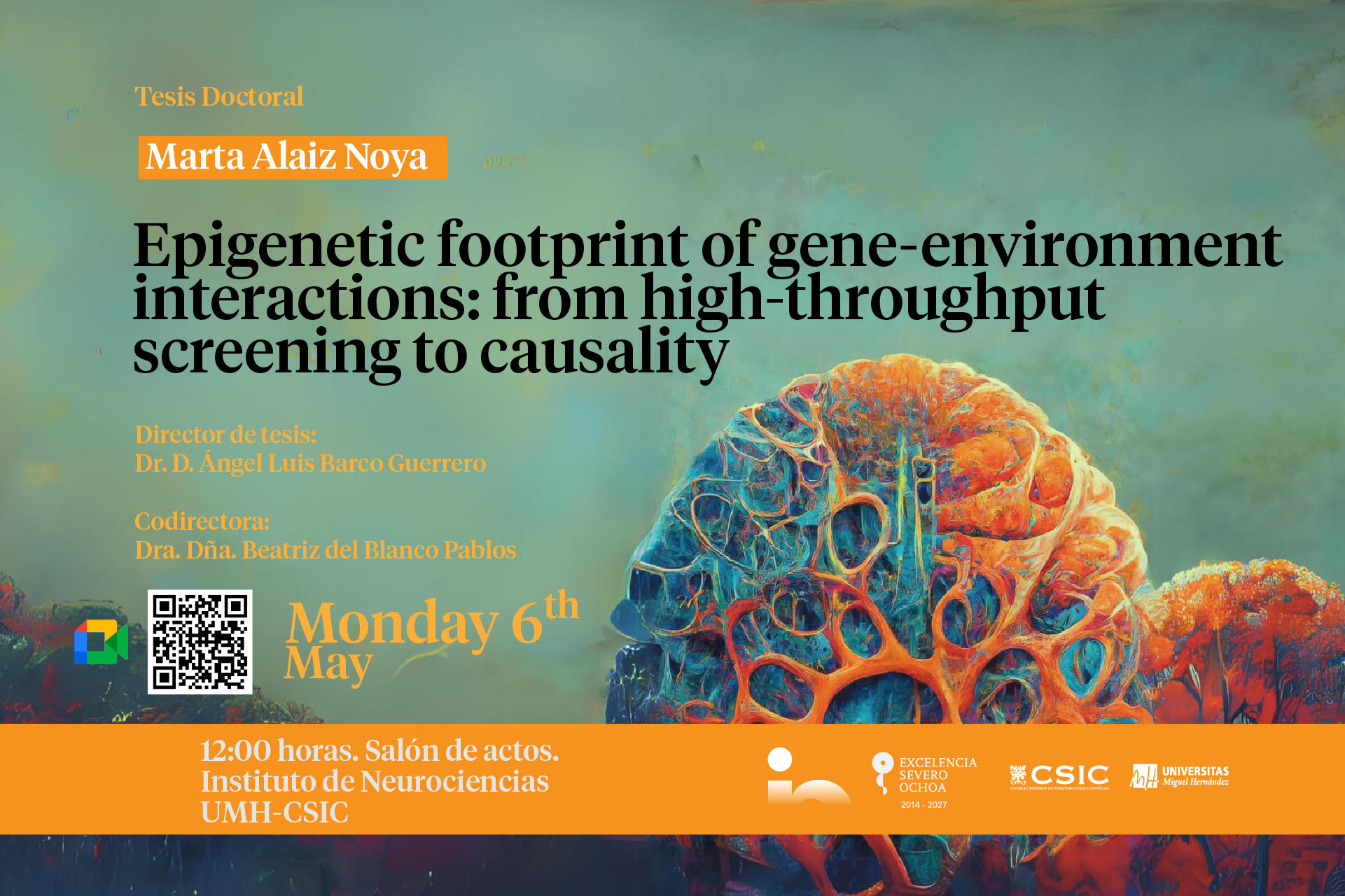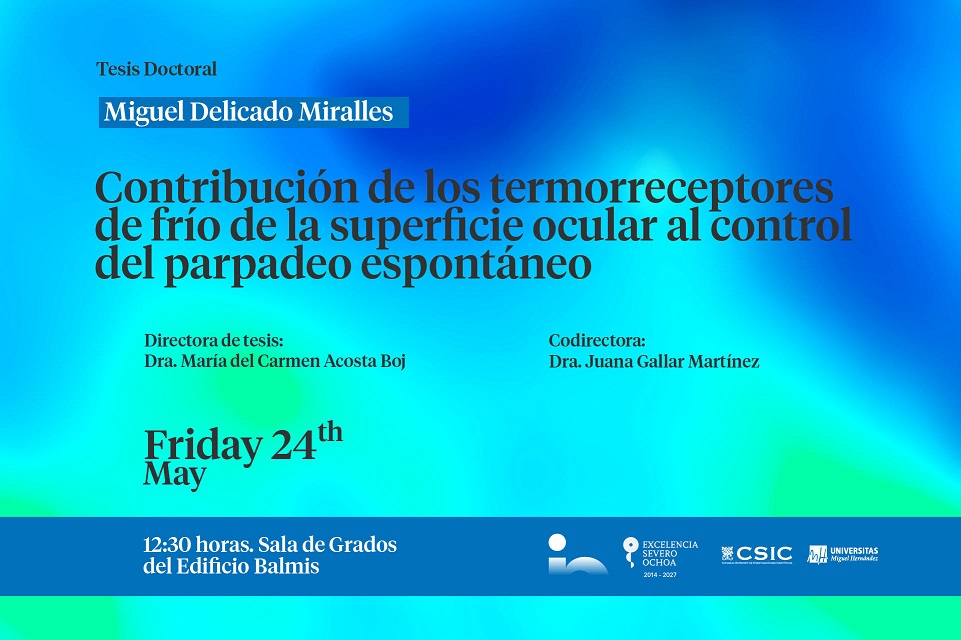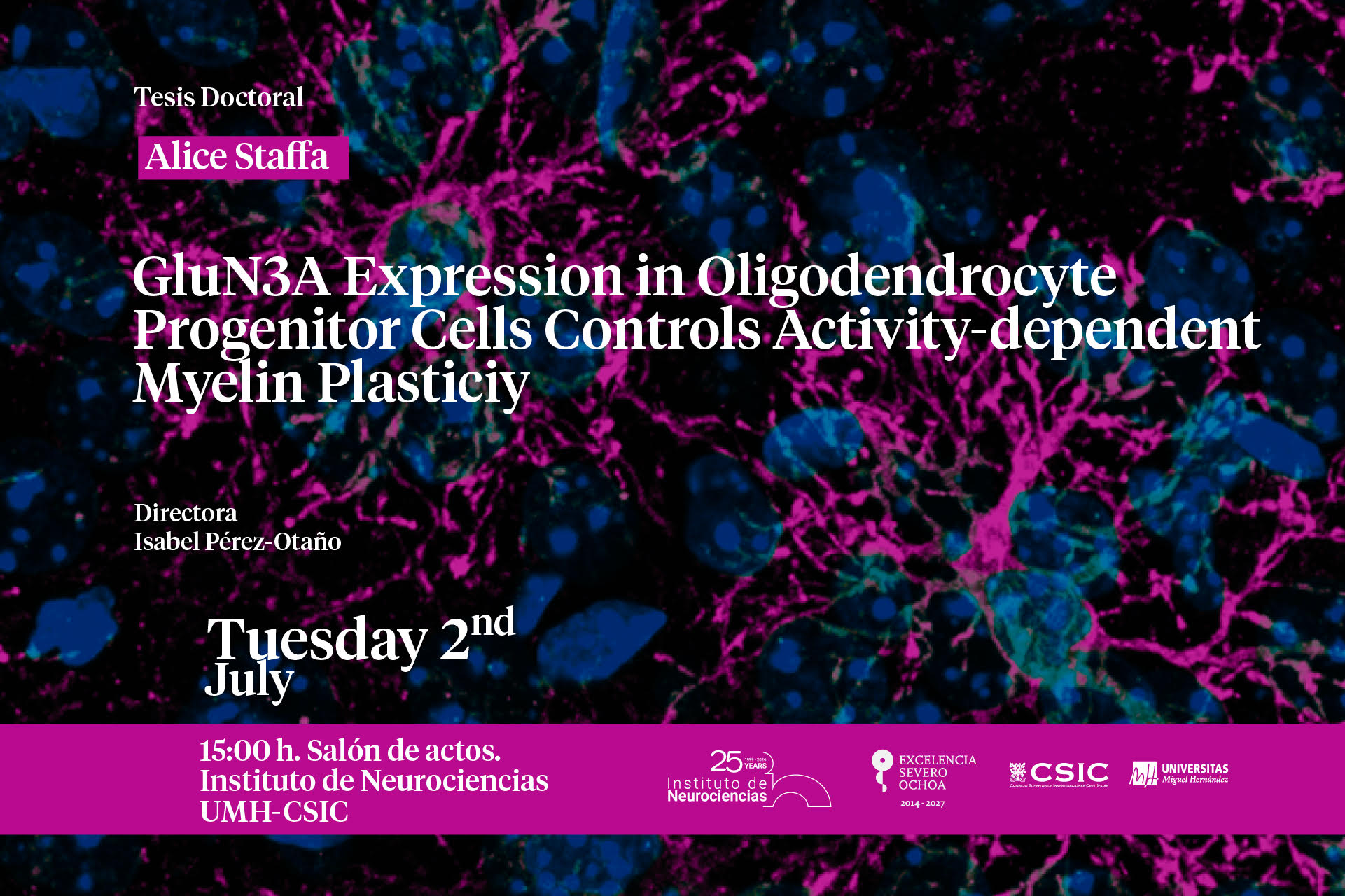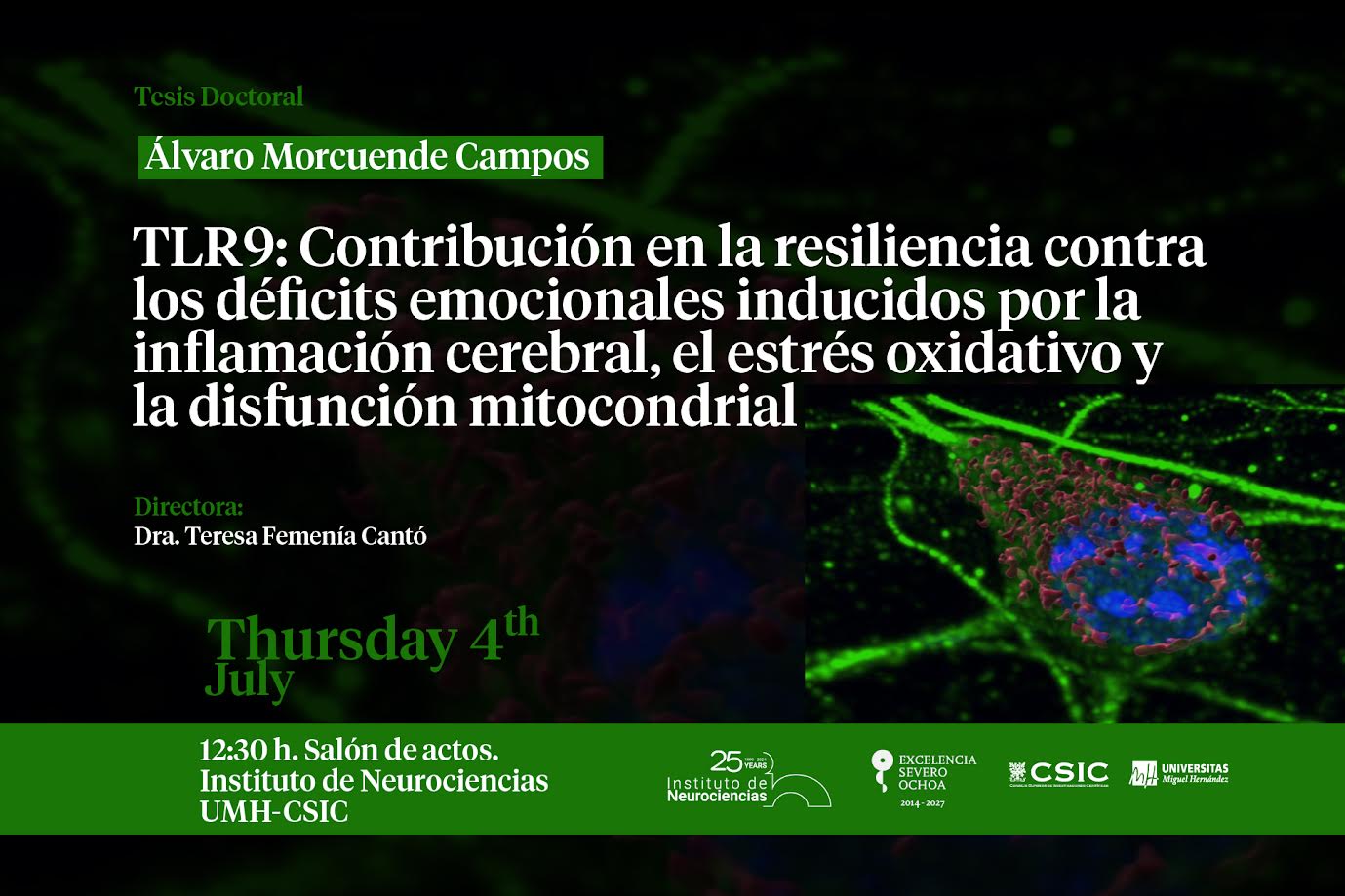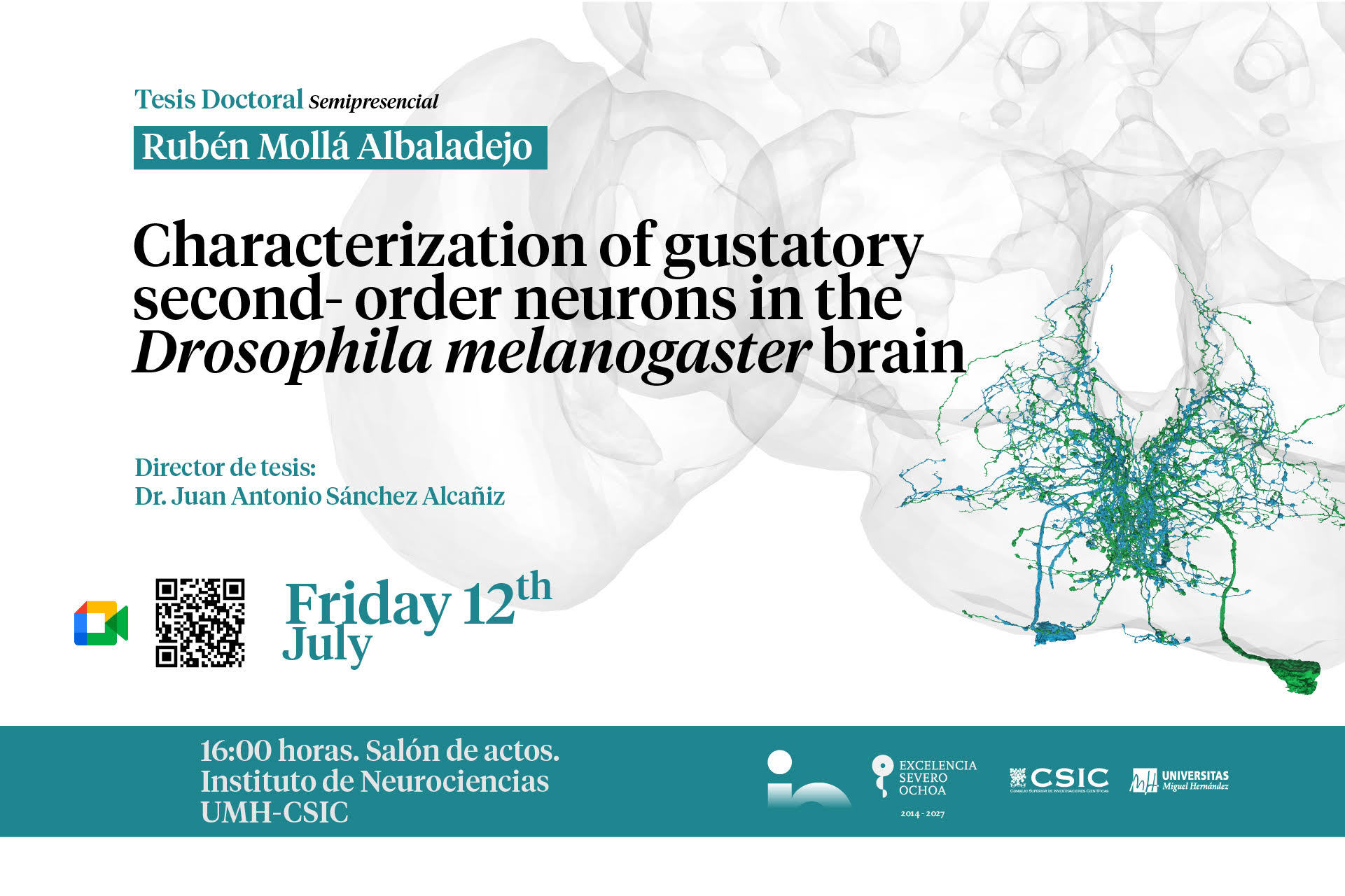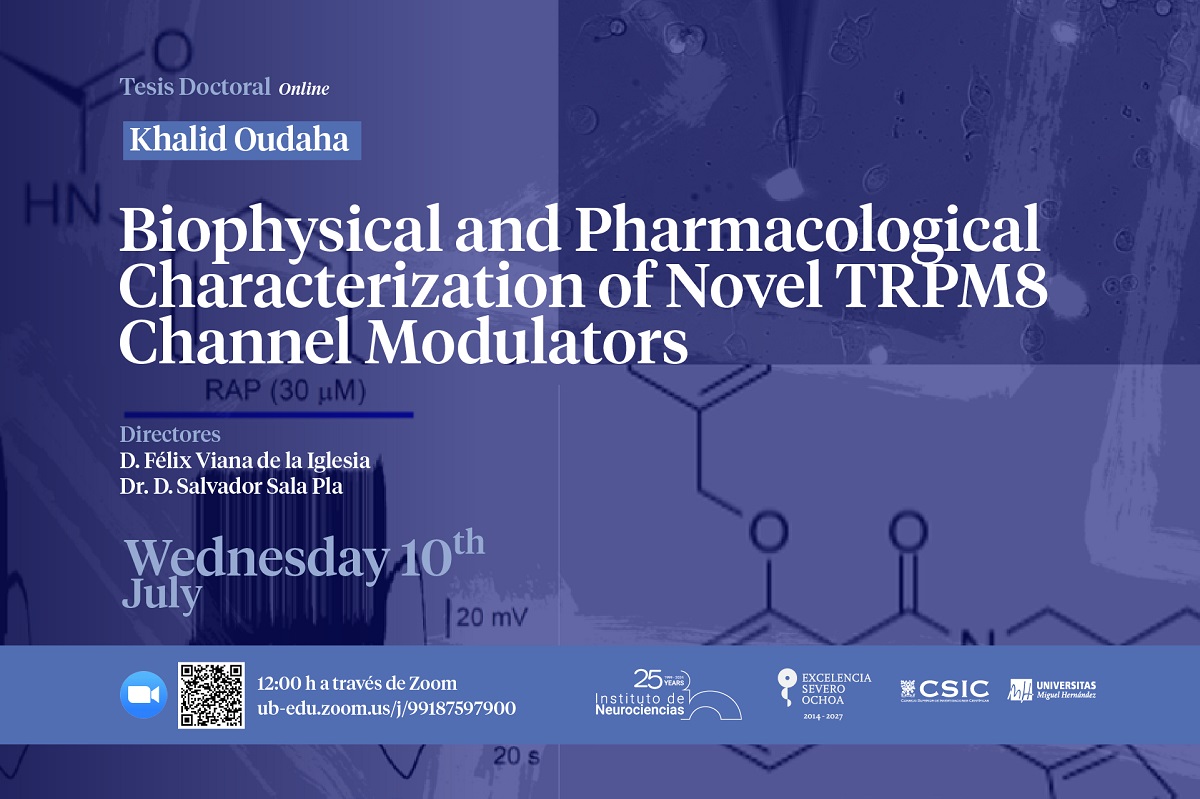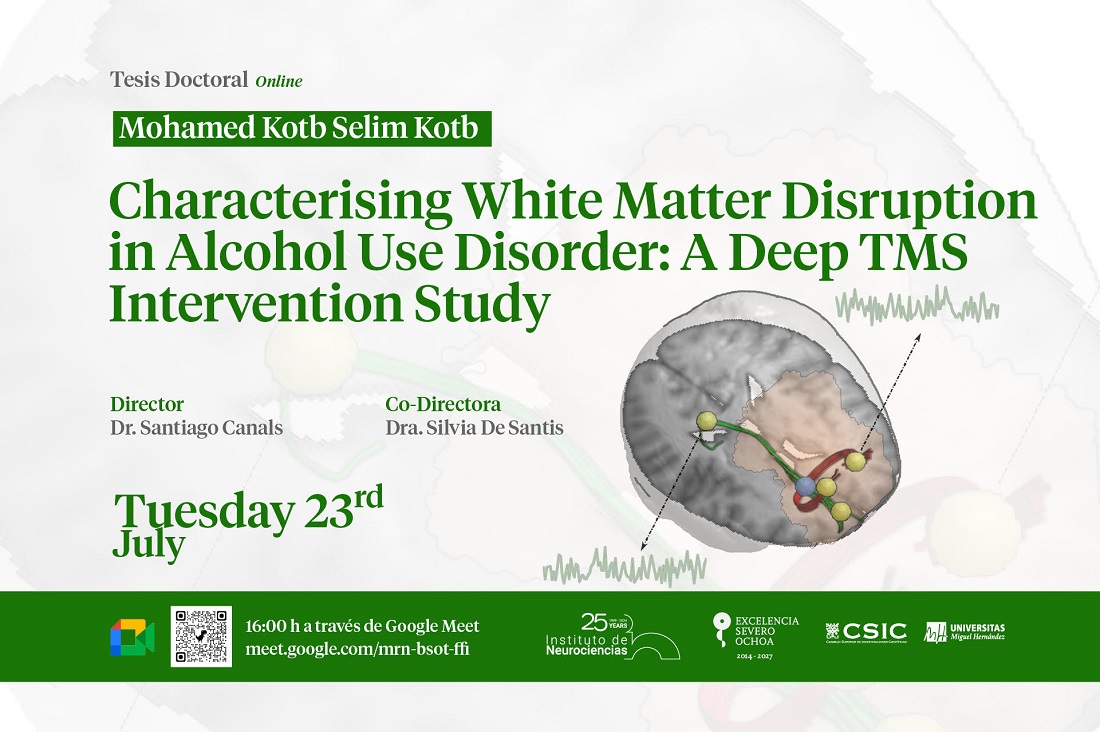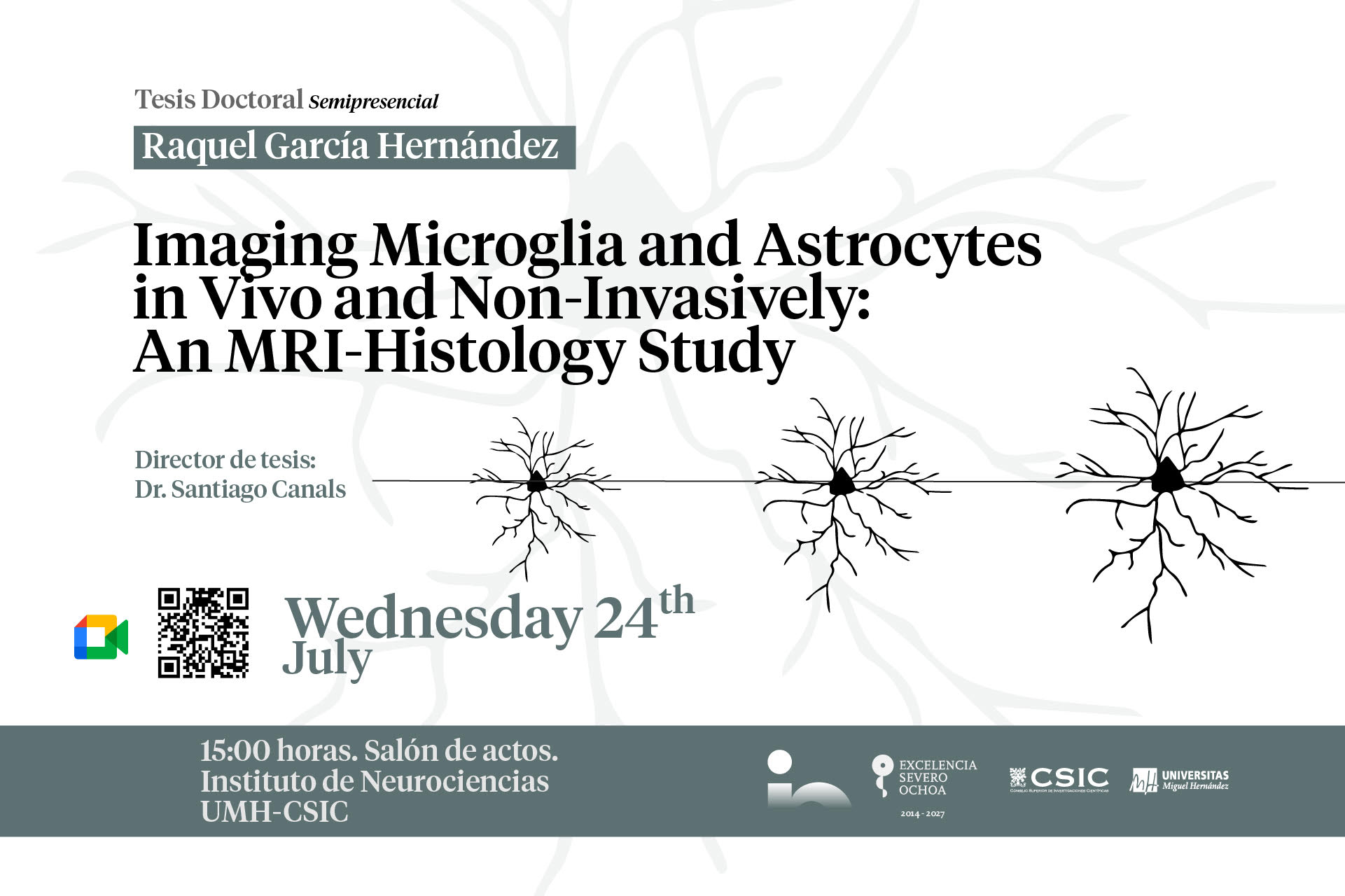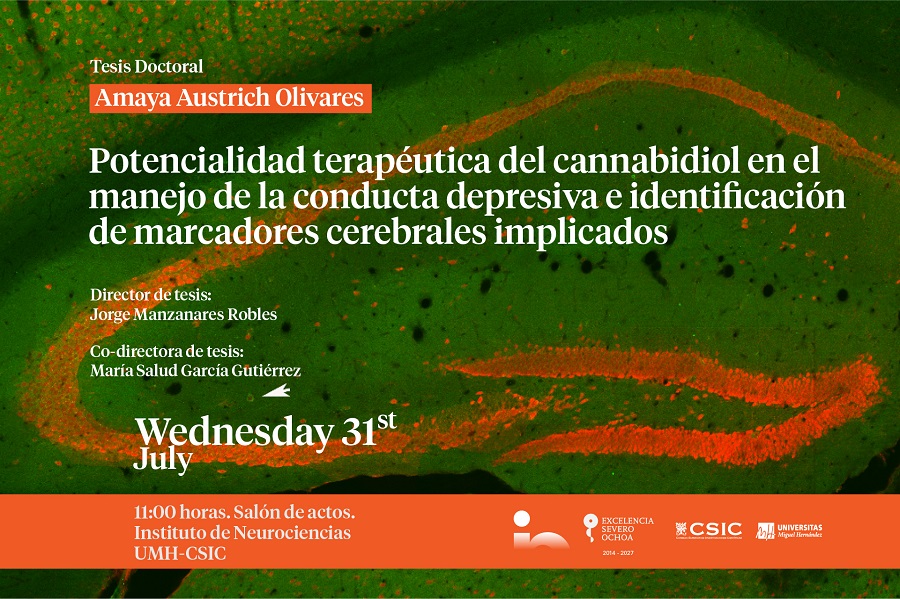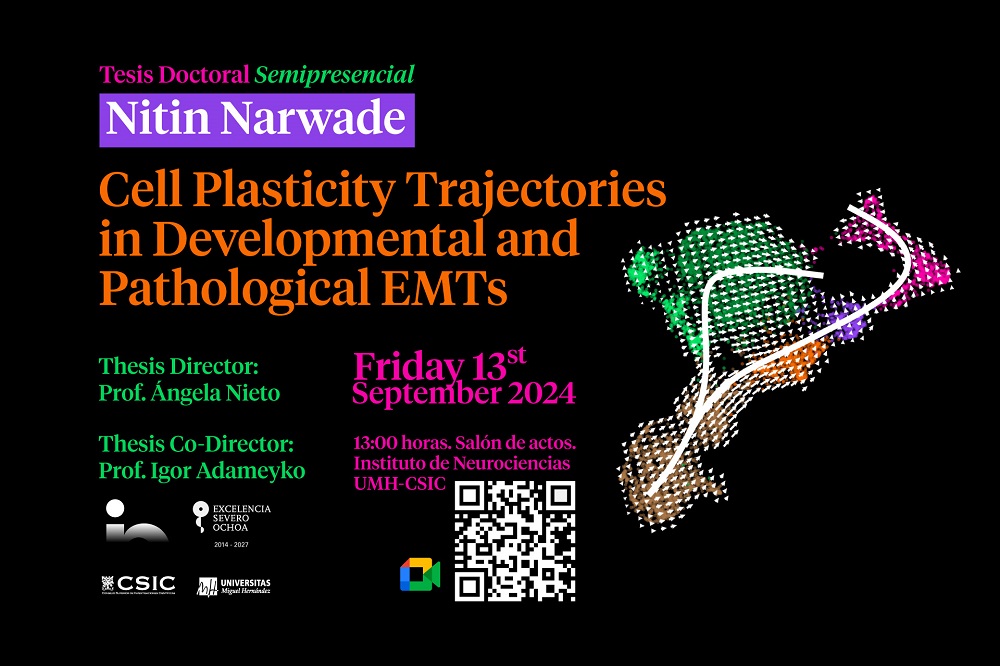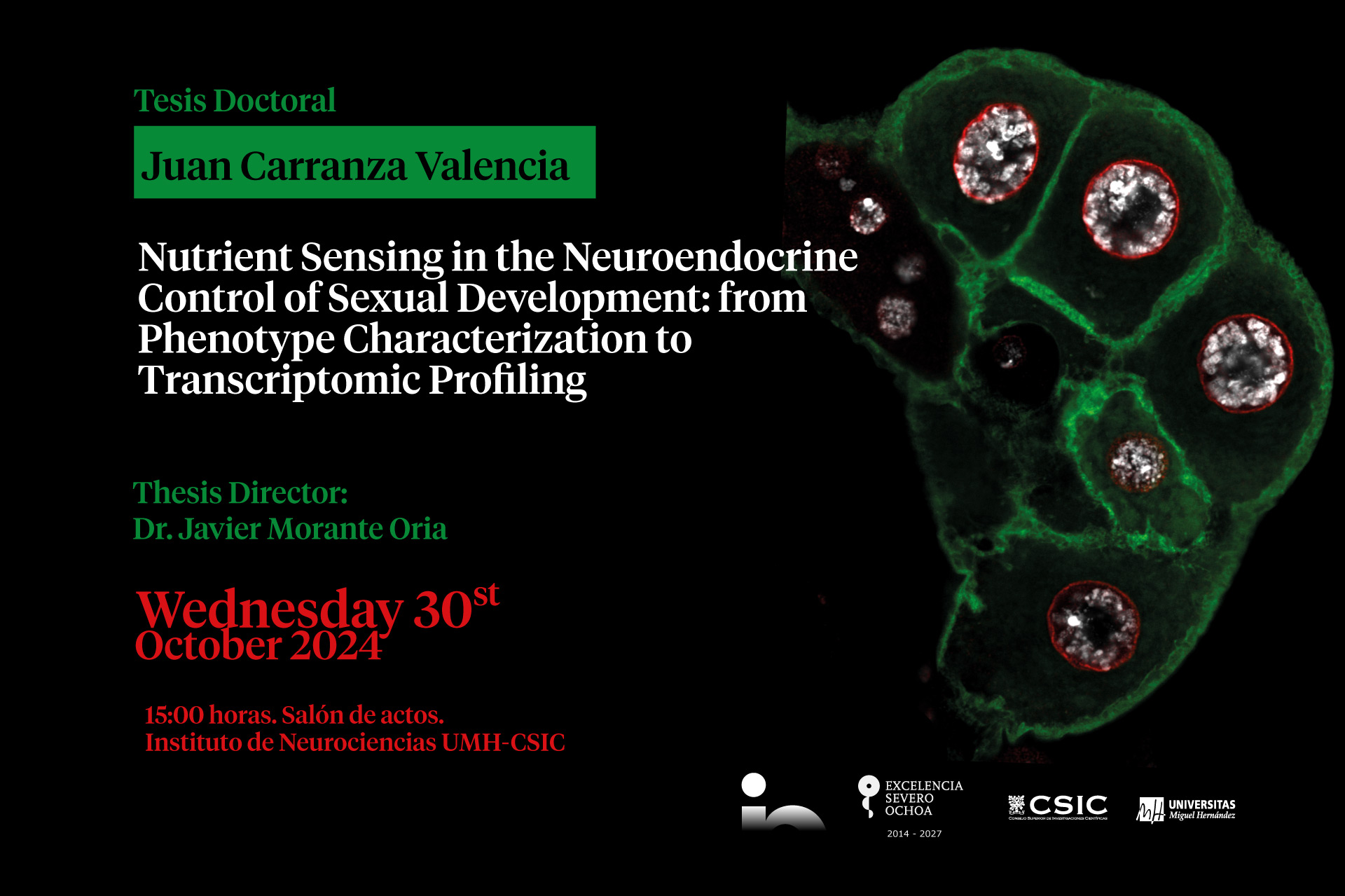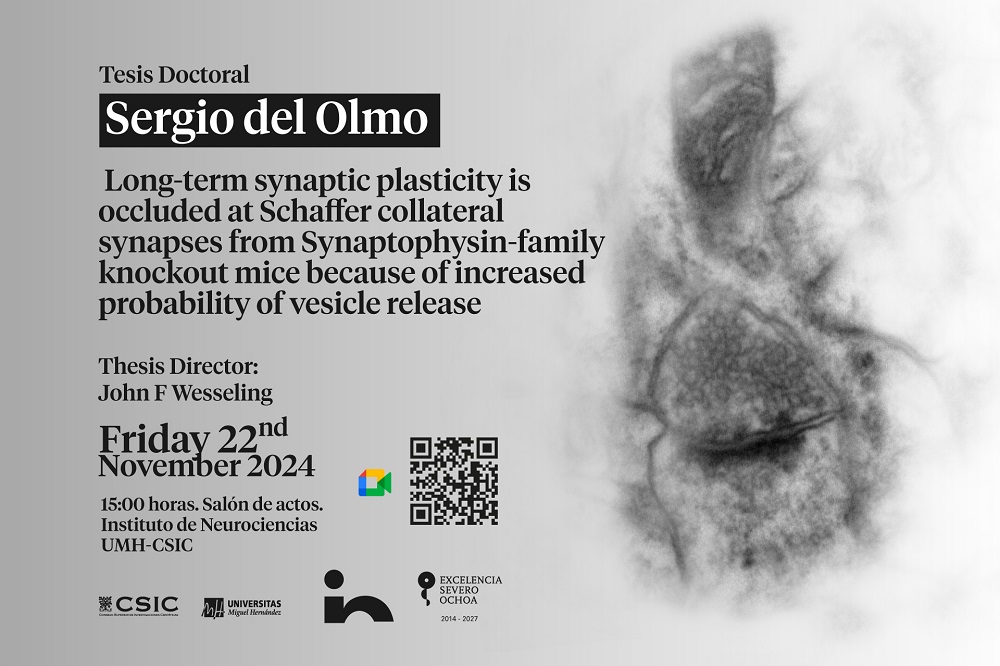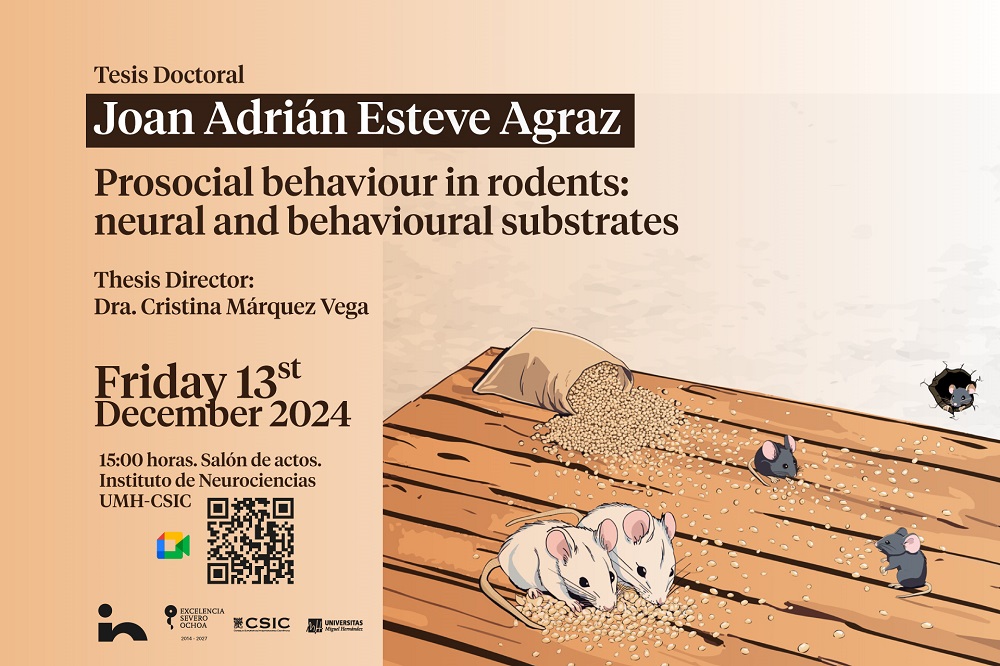PhD program: a general view
The “Instituto de Neurociencias”, is a Joint enterprise of the Universidad Miguel Hernandez (UMH) and the Consejo Superior de Investigaciones Cientificas (CSIC). The Institute is organized in three departments: “Developmental neurobiology”, “Molecular neurobiology and neuropathology” and “Cellular and systems neurobiology”. Each department develops a range of research lines.
In 2014 the Instituto de Neurociencias was distinguished by an international board in the framework of the Severo Ochoa Excellence Program. The distinction recognizes the Instituto de Neurociencias as the most relevant brain research institute in Spain.
Objectives:
The postgraduate training program integrates a theoretical and practical approach to the diverse methodologies used to study the nervous system. The program is designed to stimulate the initiative and abilities of the students, helping to orient the development of their scientific careers. The PhD program in Neurosciences has been always a vehicle for the internationalization of the Institute in which a mean of 30% of the students come from abroad.
Schedule:
4 years (+1) from the registration of the student to the thesis deposit.
- Servicio de Gestión de Estudios UMH – Doctorado: https://estudios.umh.es/doctorado/
- UMH Doctoral School: https://ed.umh.es/en/
- News: https://in.umh-csic.es/en/formation/
- Email for Official Neuroscience Doctorate Program: neurophd@umh.es
Admission requirements
The PhD in Neuroscience welcomes graduates in biology, biochemistry, medicine, psychology, biotechnology, veterinary medicine, as well as students from non-biology fields (like physics, maths and computer science) interested in neuroscience.
Students with a degree within the European Higher Education Area with a minimum of 300 ECTS are eligible. Typically students have 60 ECTS Master Degree, preferably in Neuroscience. The university degree should qualify for the start of a PhD thesis in the student’s home country. Non-European university degrees should be equivalent to a European MSc. According to the current law, students require a total of 300 ECTS credits to be admitted. It is also highly advisable and will be highly valued if PhD students have a good level of English. On the other hand, it is also necessary to have a letter from the thesis supervisor accepting the direction of the thesis.
All the admission procedure is done through the Doctorate studies web page of the University Miguel Hernandez
Guidelines for foreign researchers at the Institute of Neurosciences: Guidelines for foreign researchers IN (file PDF)
Email and contact staff for administrative procedures:
- email: doctorado@umh.es
- Antonio Guerrero Sotoca: 96 665 8598
- Mª Isabel Bernad Sánchez: 96 665 8635
- Paloma García Sánchez: 96 665 8456
- Elena Pérez Fernández: 96 665 8840
- Remedios Naharro Marcos: 96 522 2184
- Covadonga Sempere Lafuente: 96 522 2124
- Yolanda Alonso Martínez: 96 522 2692
Training activities-justification
Once the students are formally accepted in the program, through a personal on-line application they have to detail all their research activities in the program with dates and places. Every item has to be validated by the PhD supervisor.
JUSTIFICATION OF TRAINING ACTIVITIES ATTENDANCE AND PARTICIPATION IN SEMINARS AND PRESENTATION OF THESIS PROJECT:
- Research Activities and Funding (60 hours) .
6 ECTS credits. Offered by the UMH each semester.
Schedule: Fall semester of the first year. Evaluation system: Objective evaluation.
Students coming from a master with scientific background that includes a research project do not have to do this course. - Research seminars at the Institute of Neuroscience (40 hours).
One weekly seminar throughout the academic year: View IN seminars - Presentation and discussion of the thesis project.
At the end of the second semester of their first year, students publicly present their thesis project. The aim is to discuss its coherence and suggest improvements. The presentation and discussion are conducted in English. Duration: 30 minutes in a single session of seminars. Alternatively, the students can present their project in a Department/Unit seminar with the same format.
Evaluation system: Evaluation of the presentation and incorporation of improvements. - Participation in Institutional Scientific Activities.
Conferences, seminars and symposia involving PhD students are carried out as part of the scientific activities of the Institute. This type of activity is variable in its frequency and content, but every year there is a Christmas Meeting (December) and a scientific Progress Report (June) by members of the Institute. - Unit Seminars (40 hours)
Detail and planning of the same: Each of the three research units of the INA organizes seminars every two weeks in which a component of a group -generally doctoral students in the final stages and postdoctoral researchers- presents experimental results in the development phase. The objective is to discuss the results from a conceptual and methodological point of view and to suggest improvements. The presentation and discussion is done in English. Duration: 30 minutes, seminar session Assessment system: Presentation of own results. In the case of part-time Doctoral Students, the time sequence of the training activities will be adapted to their needs without undermining their performance. - Group Seminars (50 hours)
Detail and planning of the same: Most research groups organize seminars in which the progress of the experiments is discussed and the latest publications in the field are analyzed. This type of meeting is designed -among other reasons- to allow doctoral students to acquire discussion and communication skills. The frequency is usually weekly and the presentation and discussion is done in English. Temporary planning: A weekly seminar during the academic year Assessment system. Presentation of own results. In the case of part-time Doctoral Students, the time sequence of the training activities will be adapted to their needs without undermining their performance.
-
Participation in national and international conferences.
PhD students generally attends two neuroscience conferences. Due to the annual alternation of the FENS (Federation of European Neuroscience Societies) and SENC (Spanish Society for Neuroscience) conferences, they generally complete their PhD program with communications (usually in the form of a poster) at national and international meetings. Furthermore, students have the opportunity of resubmit their posters for the poster session that takes place at the Christmas Meeting organized by the Institute.
- Participation in neuroscience courses.
Organized by the Spanish society of Neurosciences or international societies (FENS, IBRO, Society for Neuroscience). It is expected that students attend 1-2 courses during their training. - Stays in external laboratories both in Spain and aboard. It is expected that students spend at least 3 months in an external laboratory.
- Participation in dissemination activities (10 hours)
The Brain Awareness Week is one of the activities the IN organizes to expose neuroscience to the public. There are several open-door sessions in which scientists of all levels explains the type of research going on at the Institute. These activities, which also include street exhibitions, have a significant commitment from PhD students. - Progress Evaluation.
Each year, the academic Commission of the PhD program will evaluate the Research Plan and the document of activities together with the reports that for this purpose must send the Thesis Director. Positive evaluation will be required to continue in the program. The students must register every academic year (including the year when the thesis is deposited) in order to confirm their status.
Application to attend scientific activities in the context of the PhD program.
For the reimbursement of the aid, up to 400 euros, the following documentation must be presented:
- Application for assistance approved by the CPAD dated prior to registration for the activity (Word document)
Important note*:
If the activity has its own aid program for the student, it will be a requirement to have requested said aid.
Download file Word- Certificate of attendance at the congress.
- Invoice issued with the following information:
UNIVERSIDAD MIGUEL HERNÁNDEZ
-Prog.Doctorado en Neurociencias.
Avda. Santiago Ramón y Cajal s/n
03350 Sant Joan d’Alacant
VAT/CIF: ES-Q5350015C
- Proof of payment.
- Personal information:
Name and surname.
Full address.
Bank details to reimburse.
Descargar fichero de AUTORIZACION de COMISION DE SERVICIO
Instrucciones para cumplimentar el documento:
En estos apartados hay que dejar lo que está marcado:
– Corresponde devengo de dietas SI
– ¿Solicita anticipo de dietas? NO
– ¿Solicita reserva de billetes? Nada o NO
– Medio de locomoción: el que utilices
– ¿Solicita reserva de alojamiento? NO
Solo rellenar donde pone RELLENA , dejar vacío lo que no pone nada y mantener lo que viene cumplimentado ya.
La Formación Transversal en la Escuela de Doctorado de la UMH (EDUMH) es una iniciativa diseñada para enriquecer y ampliar las habilidades de los doctorandos más allá de sus áreas de investigación específicas. El Plan de Formación Transversal de la Escuela de Doctorado comprende una variedad de cursos y actividades que abarcan desde investigación con perspectiva de género, habilidades comunicativas, oratoria y debate, gestión de proyectos de investigación, ética científica, hasta aspectos prácticos como el uso eficiente de recursos bibliográficos y técnicas avanzadas de investigación. Esta formación integral busca no solo potenciar la excelencia en la investigación, sino también cultivar habilidades transferibles que son valiosas en diversos entornos profesionales.
La normativa de doctorado vigente, establece que la formación doctoral incluirá, además de la actividad investigadora propiamente dicha, la realización de actividades formativas de carácter transversal organizadas por la EDUMH. Será requisito imprescindible para depositar la tesis doctoral haber cursado un mínimo de 15 horas de formación transversal durante el tiempo de permanencia del estudiantado en el programa de doctorado.
Para consultar el programa de los cursos transversales visitar: https://ed.umh.es/formacion-transversal/
To obtain the certificate of the transversal courses you have to go to the Electronic Headquarters of the UMH with our identified access and select ‘Mis trámites’ and then ‘Mis documentos’.
Results of the program
At the end of the program, the competences that the student’s should acquire are:
Basic competencies
- Systematic understanding of a field of study and command of research skills and methods related to this field.
- Ability to conceive, design, or create, put into practice, and adopts a substantial research or creative process.
- Ability to contribute to broadening the frontiers of knowledge through original research.
- Ability to make a critical and evaluative analysis and synthesis of new and complex ideas.
- Ability to communicate with the academic and scientific community and with society in general about their corresponding areas of knowledge through the usual means and languages used in the international scientific community.
- Ability to promote scientific, technological, social, artistic, or cultural advances in academic and professional contexts within a knowledge-based society.
Personal abilities and skills
- Operate effectively within contexts where there is little specific information.
- Find the key questions that need to be answered in order to solve a complex problem.
- Design, create, develop, and undertake novel and innovating projects in the field of knowledge.
- Work in an international and multi-disciplinary context on a team as well as independently.
- Integrate different areas of knowledge, cope with complexity, and formulate opinions with limited information.
- Intellectual criticism and defense of solutions
Quality accreditation of the program
The criteria of quality for the Thesis are to present a “European thesis” format, in which the student accredited a minimum of 3 months stay in a laboratory outside of Spain. Also the thesis can be presented by articles. In this case the requirement is a published (or formally accepted) article in the first quartile in which the student is first author. The same article cannot be used to endorse two theses, even if the first authorship is shared. The PhD program in Neurosciences has renewed every year the award of Excellence from the Spanish Ministry of Education.
Quality Plan
The Doctoral Programme in Neurosciences is included within the Internal Quality Assurance System (SGIC) under the UMH AUDIT System. Approved by ANECA in 2009, this system applies to all official degrees (Undergraduate, Master’s, and Doctoral), with common indicators and processes coordinated by cross-functional bodies within the university. Each programme conducts an annual review of its results, agrees on improvements, and utilises stakeholder input to foster continuous enhancement, all supported by an institutional platform that consolidates quality-related tasks and receives periodic updates.
The SGIC is underpinned by the UMH Quality Policy and Quality Plan, which are designed and approved by specialised bodies involving students, external personnel linked to the university, and university staff, thus ensuring plurality and upholding the principles of Total Quality. Its principal objectives include safeguarding the programme’s excellence, enhancing teaching and services, refining and optimising competences, meeting quality standards, and complying with the Ministry of Education’s requirements.
In this context, our doctoral programme operates under the SGIC, benefiting from its guidelines to uphold high quality standards and implement the necessary improvements on an ongoing basis.
Below you can see the student satisfaction surveys from the last two academic years:
Welcome “Comisión Académica de Doctorado”
Download guidelines (file PDF)Presentation and informative videos:
https://estudios.umh.es/doctorado/videos-informativos-de-la-aplicacion-de-seguimiento/
- Welcome presentation.
- Access to the PhD monitoring application.
- Research plan, activity documents and thesis information.
- Permanence control: request for change of dedication, extensions, absences and withdrawals.
Guidelines for foreign researchers at the Instituto de Neurociencias:
Download guidelines (file PDF)Get your digital signature:
More information at UMH WebMonitoring of PhD studies. User manual
Download file PDFScholarship and Contract Management
-Administrative support contracts and scholarships-
Contracts or scholarships managed through the UMH:
Contact the OTRI (Technology Transfer Office)
Ana Rodriguez Doural ( ana.doural@umh.es)
Contracts or scholarships managed through the CSIC:
Contact Human Resources of the Institute of Neurosciences
Email of the Neuroscience PhD Program: neurophd@umh.es
-
CAPD -Comisión Académica del Programa de Doctorado-
Coordinator: Cruz Morenilla Palao (SP3)Members:
Ana Carmena de la Cruz ( SP1)
Berta López Sánchez-Laorden (SP2)
Ramón Reig García (SP4)
Hugo Cabedo Martí (SP5)
Javier Morante Oria (SP6)
Silvia De Santis (SP7) - International relations IN:
Bibian García García / bibian.garcia@umh.es
- PhD Student delegates:
Delegate: Jorge Maldonado Torres / jorge.maldonadot@umh.es
Subdelegate: Manuela De Las Casas Felgueroso / manuela.casas@umh.es
- International host collaborators / volunteers:
Alicia Alonso Andrés / a.alonso@umh.es
Bárbara Corral Sánchez /bcorral@umh.es
Ernesto Sáez Carrión /e.saez@umh.es
Rules for Studies and Procedures
PhD Studies regulations Universidad Miguel Hernández – Boletín Oficial de la UMH
Download file PDFOfficial documentation of the degree – Verification memory
More information: Doctoral Program in Neuroscience
Royal Decree governing doctoral studies 99/2011
Download file PDFModification July 18, 2023 of Royal Decree 99/2011
Download file PDFManual de seguimiento de doctorado
En el siguiente enlace se pueden descargar guías, enfocadas tanto a directores como a doctorandos, en las que se explica detalladamente el funcionamiento del acceso web de la UMH relativo a la función de «seguimiento de doctorados». Son guías útiles para poder sacar todo el provecho que tiene esta aplicación y os animamos a que las reviséis.
Cuando se tenga que subir algún documento es recomendable utilizar nombres sencillos sin símbolos, ni “ñ”, ni tildes ni guiones.
Manuales UMH de usuario: director y doctorando
Descargar manuales (fichero PDF):
View video TURNITIN: https://www.youtube.com/watch?v=3yZohEpsKmI
Preparation and process for the presentation of the thesis:
Enter the virtual campus with your identified access to follow the entire process of the thesis. More information at: https://campus.umh.es/
After completing the thesis::
- IBRO Exchange Fellowships
- IN.pulse
- Observatorio Ocupacional de UMH
- National Postdoctoral Fellowships
- International Postdoctoral Fellowships
Extraordinary PhD Award – UMH
Each academic year, the UMH convenes the submission of applications to opt for the Extraordinary Doctorate Award of the previous academic year. This call will be published on the bulletin board:
https://estudios.umh.es/doctorado/tablon-de-anuncios/
You can consult the bases of the call for the previous academic year by searching this bulletin board.
Rectoral Resolution by which the granting of extraordinary PhD prizes of the Miguel Hernández University of Elche are published:
Awarding of prizes to relevant CSIC doctoral thesis
Since last year (2022), the CSIC convenes the Relevant PhD Thesis awards of the previous academic course. In addition to promoting an excellence PhD, the CSIC wants to recognize the work of the researchers with talent, helping them to advance in their professional career. The doctoral theses defended at the IN will be submitted within the global area of Life.
Resolución de 31 de enero de 2023 del Departamento de Postgrado y Especialización de la Agencia Estatal Consejo Superior de Investigaciones Científicas M.P. (CSIC), por la que se publica la concesión de los premios a tesis doctorales relevantes del CSIC.
*Premio a la tesis doctoral de María Sáez García del Instituto de Neurociencias.
See all thesis in the institute’s agenda:
Thesis Institute Neurosciences
Thesis gallery 2026
(Note: click on the arrows above the image to navigate between the thesis)
Thesis gallery 2025
Thesis gallery 2024
Thesis (format file .pdf):

ARGENTINA
ARGENTINA
BRASIL
CHINA
COLOMBIA
EGIPTO
EGIPTO
GRECIA
GRECIA
GUATEMALA
INDIA
INDIA
INDIA
INDIA/ESPAÑA
INDIA
INDIA
ITALIA
ITALIA
ITALIA
ITALIA
ITALIA
ITALIA
ITALIA
MARRUECOS
MEXICO
REINO UNIDO
The file “Guidelines for Foreign Researchers at the Instituto de Neurociencias” is available in the following link:
- EMBO “Scientific Exchange Grants”
- FENS/IBRO-PERC Fellowships
- NENS Courses
- GENERALITAT VALENCIANA: Programa I+D+i (Grants for PhD students for stays in research centers outside the Comunitat Valenciana)
- Programa iMOVE CSIC: https://imove.csic.es
Have you been in a lab abroad? Where did you go? For how long? What finance did you get for that?
Share your experience with us!
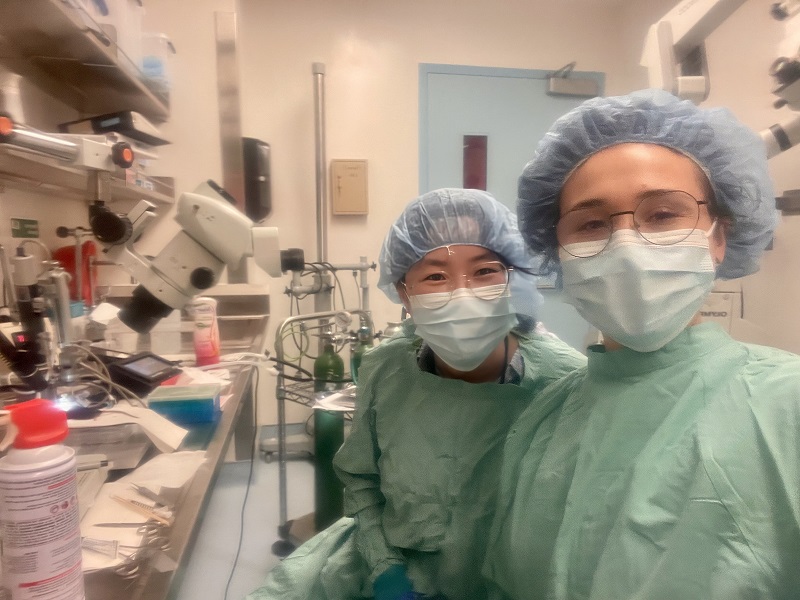
Paula Sierra Díaz
San Francisco/USA
“I found myself in a land that felt both familiar and foreign”
Nearly 9,400 km from UMH, I found myself in a land that felt both familiar and foreign. Once again, I was an outsider, yet immersed in a world of striking parallels and contrasts. Between the beaches and mountains lay the city’s iconic ups and downs—much like the challenges we’ve faced throughout the PhD. The Harwell Lab at the University of California, San Francisco, focuses on understanding the development and diversity of neural circuits. The lab employs molecular biology, genetic tools, and circuit tracing techniques in mouse models to investigate cell fate specification and neuron-glia interactions in forebrain circuit formation. During my stay, I have been exploring molecular datasets and integrating them with my research data. Additionally, I have conducted data analyses to measure gene expression at the RNA level, aiming to identify cell types associated with cognitive abilities and social interactions.
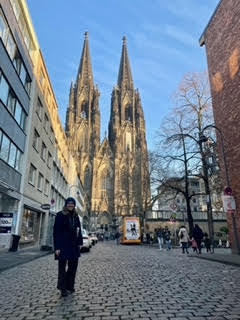
Chiara Nappi
Cologne/Germany
“Those three months in Cologne were incredibly enriching, both professionally and personally“
I spent three incredible months of research stay in Cologne, Germany, at Uniklinik Köln. This research stay was made possible by a Scientific Exchange Grant from EMBO, and I worked under the guidance of Prof. Graziana Gatto. I learned and implemented the intraspinal delivery route, which was crucial for my future experiments. Plus, I got to dive into high-resolution behavioral analysis, including kinematic recording and the MoSeq approach. The social side was just as awesome. I met cool people from all over the world and I explored Cologne, which is such a vibrant and surprising city. Those three months in Cologne were incredibly enriching, both professionally and personally. I came back home with a ton of new knowledge and memories that I’ll cherish forever.
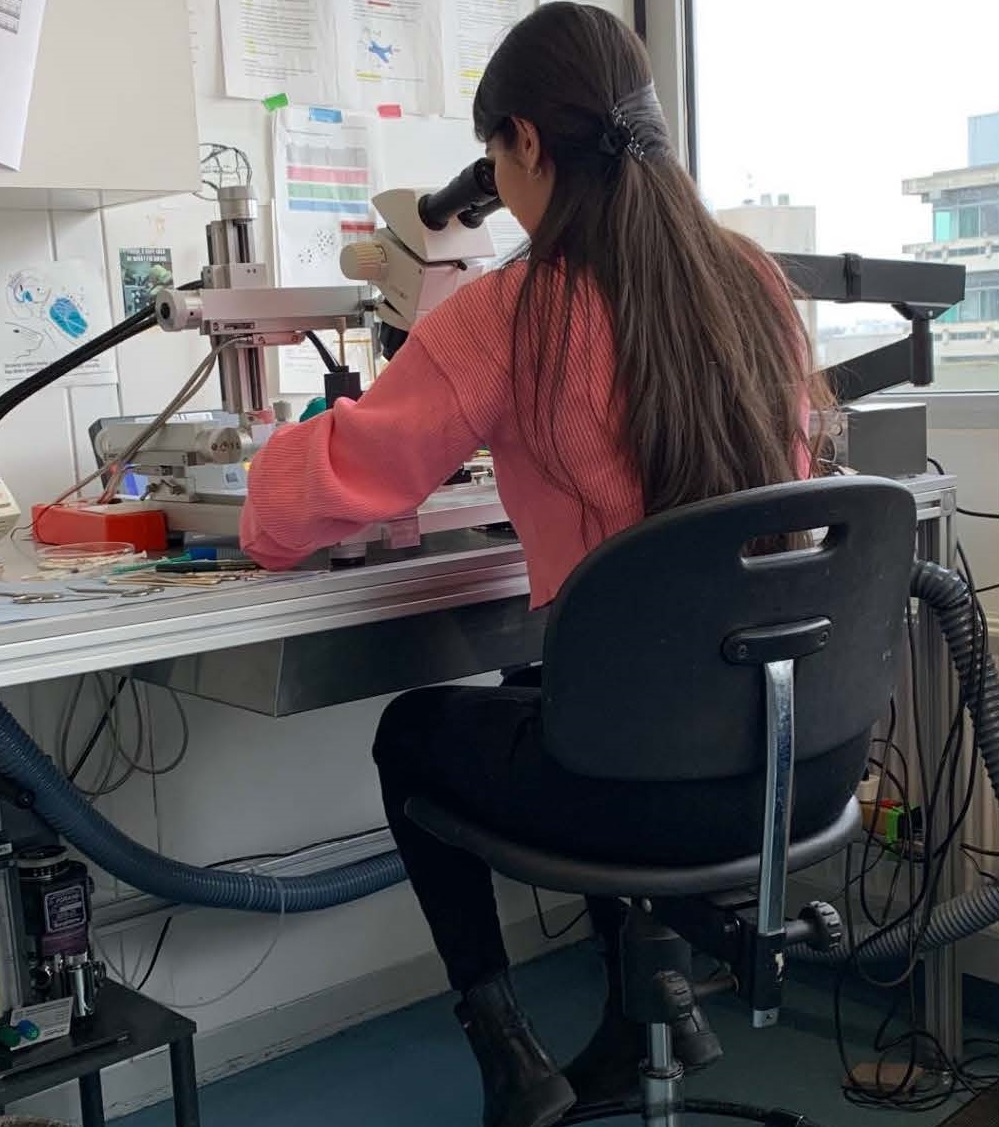
Helena Bortolozzo Gleich
Heidelberg/Germany
“This experience enhanced my PhD”
I had the opportunity to perform a research stay in the laboratory of Prof. Dr. Alexander Groh at the Department of Physiology and Pathophysiology, University of Heidelberg, Germany. This three-month research visit was made possible through the mobility funding provided by the University of Miguel Hernández (UMH), aimed at supporting doctoral candidates pursuing international recognition for their research. The focus of my stay was to gain experience with in vivo electrophysiology, using multi-electrode recordings in freely behaving animals. We recorded the brain activity during a sensory discrimination task to understand how the brain processes the acquisition of new rules. This experience enhanced my PhD project and my data analysis skills. Additionally, Heidelberg’s combination of beautiful surroundings and its status as a leading hub for preclinical and clinical research made it a highly enriching environment.
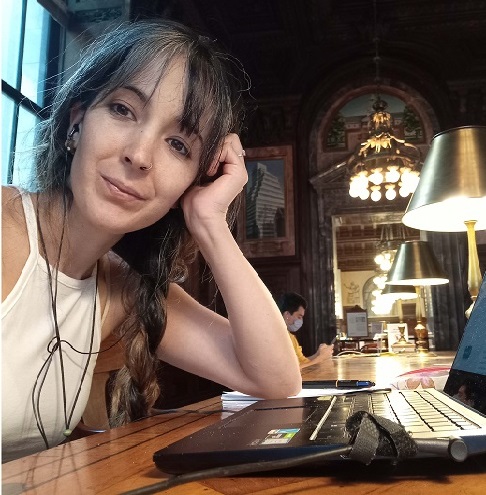
Raquel García Hernández
New York / USA
“I would repeat it a thousand times”
During my research stay, I went to New York, USA, specifically at New York University’s Langone Center for 3 months. Under the guidance of M.D., Ph.D. György Buzsáki and Ph.D. Manuel Valero, my experience was truly amazing. I learned new technology like electrophysiological recordings in freely moving animals using multichannel systems, and the basics of analyzing it all, which I later shared with my lab and I want to use in my postdoc. I also gained a deeper understanding of how the brain communicates and even opened up new ways of conceptualizing information processing. Socially, it was fantastic too; I made lots of friends, had endless discussions, and explored the incredible city of New York. Additionally, I gained valuable insights into differing perspectives on science and academia across borders, aiding in shaping my academic trajectory and helping me in taking future decisions.
I would repeat it a thousand times, thanks to everyone and who made it possible!
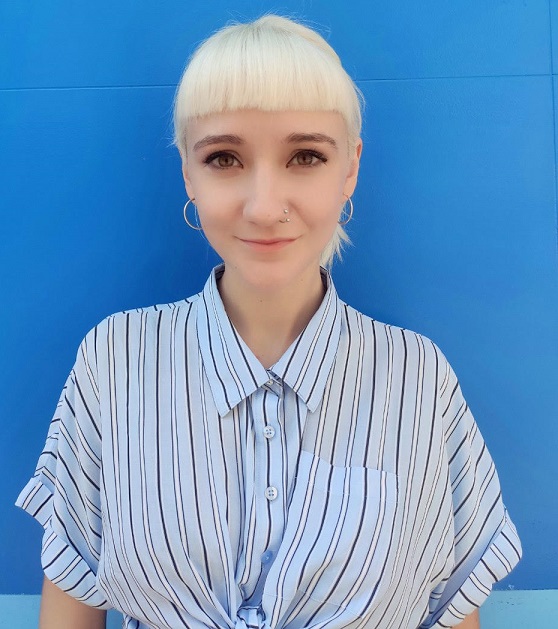
Laura Frutos Rincón
Boston / Paris
“Both stays gave me a lot on a professional and personal level”
During my PhD I have completed two stays abroad of a completely different, but equally enriching, nature.
The first one, in 2019, was at Tufts Medical Center in Boston, MA, under the supervision of Dr. Pedram Hamrah. This one-month stay was part of a collaboration between the two laboratories, and during it, I set up the electrophysiology set-up that I use in my experiments in Spain there and trained the lab staff in its use.
In addition, the following year I spent three months at the Institut de la Vision in Paris, under the supervision of Dr. Annabelle Réaux-Le Goazigo, funded by a Generalitat Valenciana mobilty grant (“Subvenciones para estancias predoctorales fuera de la Comunitat Valenciana, BEFPI 2020). During this stay, I learned different techniques and carried out numerous experiments directly related to the topic of my doctoral thesis.
Both stays gave me a lot on a professional and personal level. Getting to know other laboratories, other techniques, different ways of working… is a fundamental process in professional growth. On the other hand, being away from your country makes you much more autonomous and resolute, as well as allowing you to get to know other cultures and ways of life, which is a turning point on a personal level.

Michael Joe Munyua Gachomba
Marseille, France
“The institute provides a very good scientific environment, with a vibrant community of researchers”
The doctoral fellowship INPhINIT, awarded each year by laCaixa foundation through a competitive call, counts with a fixed budget per year to be used for visits, courses, and congresses. Thanks to that, I spent three months at the Institut de Neurosciences de la Timone (INT, Marseille, France), joining a collaborative project between two labs. There, I learned to model and analyze stop-signal reaction times collected from a previous experiment combining fMRI and with a motor inhibition task. I also taught basic Python programming to an undergraduate, while she helped me to acquire coding skills in R. The institute provides a very good scientific environment, with a vibrant community of researchers who organize scientific and social activities on a regular basis.
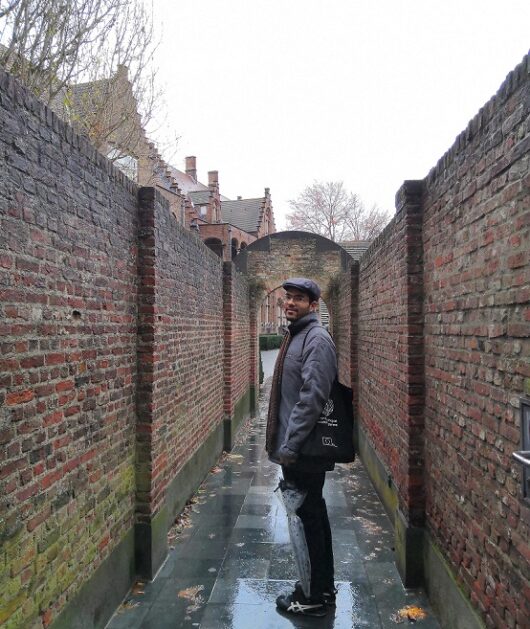
Mohamed Kotb Selim
Brussels
“The experience was enriching in all aspects”
From September to December 2021, I joined the group of Prof. Philippe de Timary, a full clinical professor at the Institute of Neuroscience (IoNS), The Catholic University of Louvain and Cliniques universitaires Saint-Luc (UCLouvain), Brussels, Belgium.
I was involved in the data acquisition and analysis of brain scans obtained from alcoholic patients, who were admitted to clinics for rehabilitation. The goal was to study the early brain adaptations after the 3 weeks of treatment course, combining volumetric and diffusion MRI with patients inflammatory profiles, in conjunction with the clinical and psychiatric measures before and after treatment, including depression and craving scores, this work is being prepared for publication.
The experience was enriching in all aspects, I learned new techniques and expanded my knowledge with the clinical work, something I was lacking due to the preclinical nature of my PhD project. Also, Brussels is a very nice and large city, as the capital of the European Union it is very vibrant, I enjoyed the city vibes and food, especially the legendary waffles. I really miss the cold breezes of Brussels.
Lastly, thanks to the International Mobility Grant offered by Universidad Miguel Hernandez (UMH) that covered most of my research stay expenses.
Academic Calendar year 2025-2026
Download file PDFAcademic Calendar Universidad Miguel Hernández
More information at Web UMHPhD students academic year 2025-2026
(Photos: Instituto de Neurociencias)
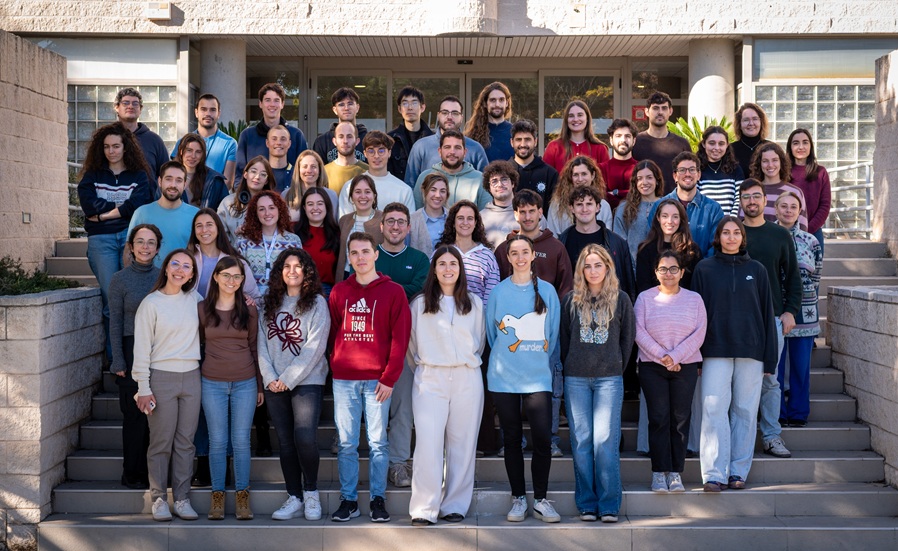
PhD students academic year 2024-2025
(Photos: Instituto de Neurociencias)
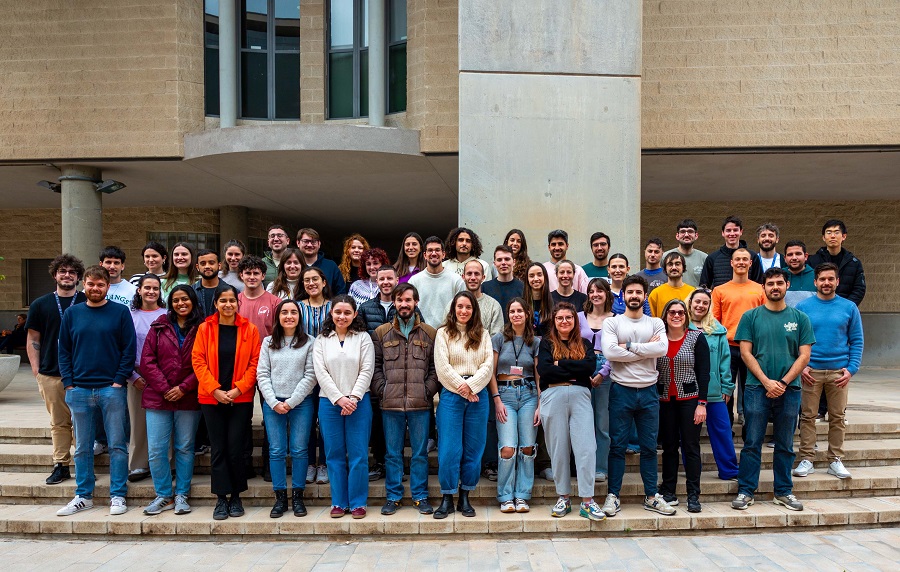
PhD students academic year 2023-2024
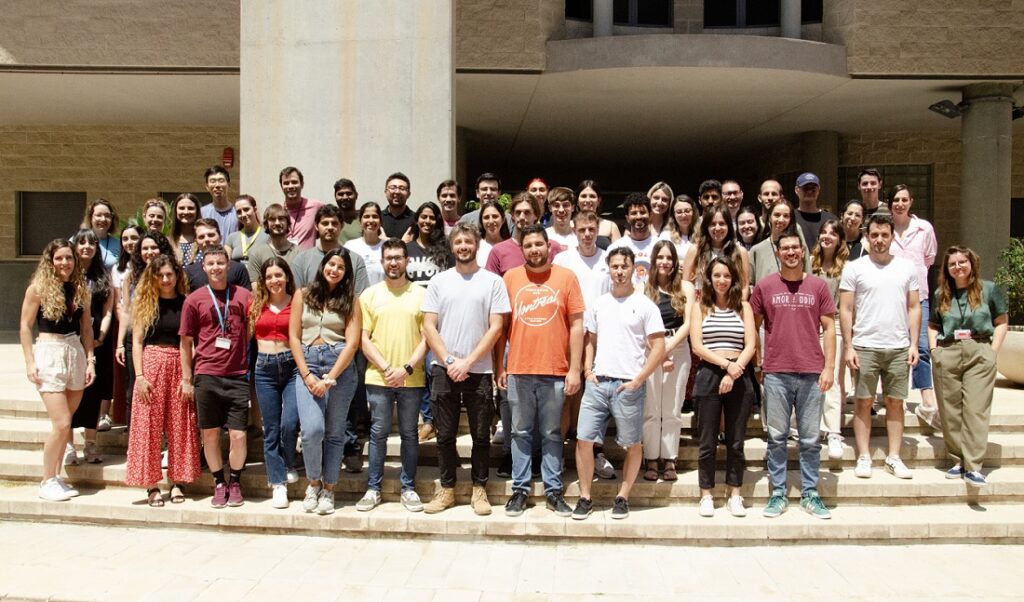
PhD students academic year 2022-2023
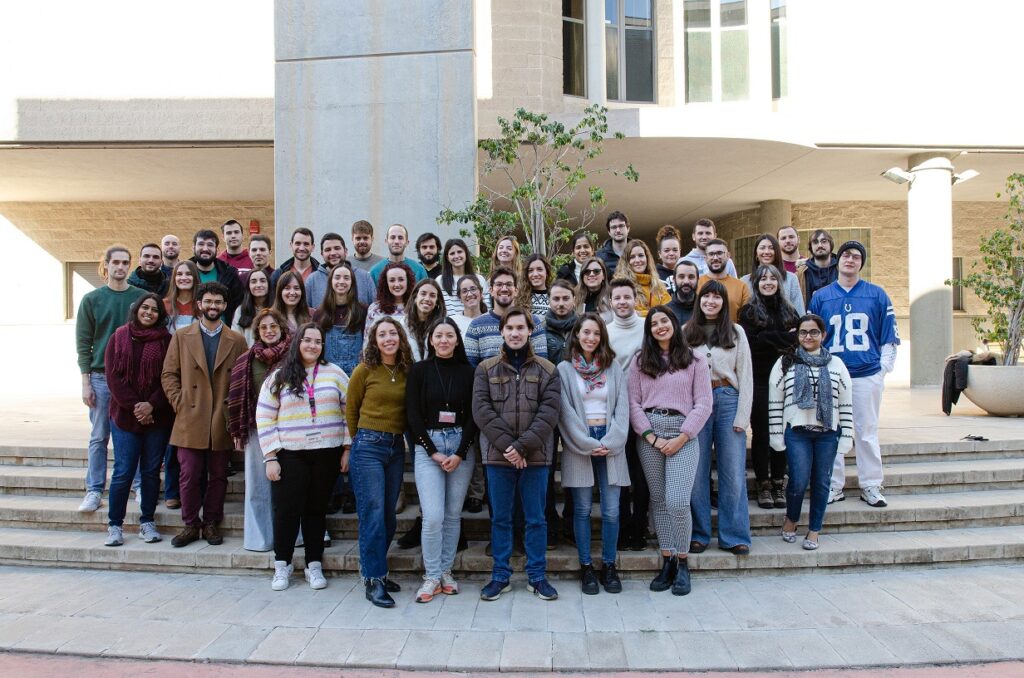
Intranet Files:
Solo visible para miembros.
Acceder

 Español
Español